Dopamine rush: Understanding the basics
Names of Allah 78-90
Page 6
Seal of the Prophets and the Finality of Prophecy — A Rejoinder to Uri Rubin
Page 9
THE WEEKLY
www.alhakam.org
AL HAKAM | Friday 18 August 2023 | Issue CCLXXXIII
Ahmadiyya Archive & Research Centre (ARC), 22 Deer Park Road, London, SW19 3TL, UK info@alhakam.org | ISSN 2754-7396
TikTok, fake news & the infodemic era
‘Prince of the Faithful received at Town Hall’: Hazrat Musleh-e-Maud in Hamburg, Germany, 1955
Page 11
TikTok has now become the single most popular source of news for teenagers in the UK, as uncovered by an Ofcom research.

Traditional news platforms find themselves in the rearview mirror as a rising number of teens now rely on TikTok for their daily news fix. The media regulator found that a significant 28% of 12 to 15-year-olds utilise the app to stay
SolenFeyissa|Unsplash
Hadith-e-Rasul – Sayings of the Holy Prophet Muhammadsa
Twelve rulers of Muslims
It is narrated by Jabirra bin Samura, “I heard the Prophetsa saying, ‘There will be twelve rulers.’ He then said a sentence which I did not hear. My father said that he had said, ‘All of them will be from Quraish.’” (Sahih alBukhari, Kitab al-ahkam, Hadith 7222, 7223)
His Own Words
Tawakkul
“Those who place their trust in God Almighty and turn towards Him never experience defeat. Individuals who solely depend on their own endeavours can expect nothing but disgrace. From the dawn of creation, it has been God’s divine pattern that those who forsake worldly pursuits gain nearness to Him, while those who ardently chase them remain deprived. Even if people who lack a bond with God Almighty momentarily succeed through deception, their accomplishments are in vain, for they are destined to face profound disappointment eventually. In Islam, the truly eminent individuals were those who prioritised faith over worldly concerns. In India, Qutubuddin and Muinuddin emerged as God’s saints [ awliyā ], displaying
Continued on next page >>
A
Page 3
Continued on next page >>
ﻰﻠﺻ ��ﻨﻟا ﺖﻌ�� لﺎﻗ ،ة��ﺳ ﻦﺑ ﺮﺑﺎﺟ ﺎﻨﺛا ن��ﻳ :لﻮﻘﻳ ﻢﻠﺳو ﻪﻴﻠ� ���ا ﺎﻬﻌ��أ ﻢﻟ ﺔﻤﻠ� لﺎﻘﻓ ـ ا��ﻣأ ��ﻋ .ﺶ�ﺮﻗ ﻦﻣ ��ﻠ� ـ لﺎﻗ ﻪﻧإ ��أ لﺎﻘﻓ
Hazrat Mirza Ghulam Ahmadas, In
<< Continued from previous page
little regard for worldly matters when weighed against their faith. These individuals worshipped God Almighty in obscurity, yet He magnified their esteem.” (Badr, Vol. 8, August 1907; Malfuzat [1988], Vol. 5, p. 248)
<< Continued from previous page

updated on current affairs, surpassing all other platforms. YouTube and Instagram closely follow, with 25% usage each. ( www.ofcom.org.uk/__data/assets/pdf_ file/0024/264651/news-consumption-2023. pdf)
So, is this a cause for concern? That TikTok, which “has often been seen as a platform for lighter topics”, is now a goto for the latest headlines? Nic Newman, a senior research associate at the Reuters Institute for the Study of Journalism, continued to observe:
“Until recently, the network had a reputation built almost exclusively on fast-moving, funny, or musical memes, but stories such as Black Lives Matter, the Covid-19 pandemic, and the war in Ukraine have helped make news a much bigger part of the mix.” (https://reutersinstitute.politics. ox.ac.uk/how-publishers-are-learningcreate-and-distribute-news-tiktok)
The findings of this research set off alarm bells for many due to the app’s reliability being under consistent scrutiny. Qualitative studies of younger consumers show that many worry about the potential for misinformation on the app (https:// reutersinstitute.politics.ox.ac.uk/news/ kaleidoscope-tracking-young-peoplesrelationships-news). And now, with the rise of deepfake, it is becoming increasingly difficult to differentiate fact from fiction.















A piece in The New York Times stated that “misleading edits, fake news stories,
and deepfake images of politicians are starting to warp reality on the popular video platform.” This came after a screenshot of a non-existent CNN story about climate change was circulated; one video was edited to imply White House press secretary, Karine Jean-Pierre, ignored a question from a Fox News reporter; and even deepfakes of President Biden singing “Baby Shark” instead of the national anthem!
Tiffany Hsu, a reporter on the technology team for The New York Times, hits the nail on the head: “The danger of manipulated media lies in the way it risks further damaging the ability of many social media users to depend on concepts like truth and proof. […] Extended exposure to manipulated media can intensify polarization and whittle down viewers’ ability and willingness to distinguish truth from fiction.” (www. nytimes.com/2022/11/04/technology/tiktokdeepfakes-disinformation.html)
What must be said, however, is that TikTok, much like any other social media platform, isn’t entirely negative by nature. The problem stems from its exploitation by those who spread false stories and foster negativity. The line between real and fake is becoming increasingly blurred, prompting the question: How can we address this?
There is a clear principle in Islam when it comes to any sort of news: thorough verification and confirmation of its accuracy (Surah al-Hujurat, Ch.49: V:7). When we meticulously examine the news source, its credibility, or lack thereof, very
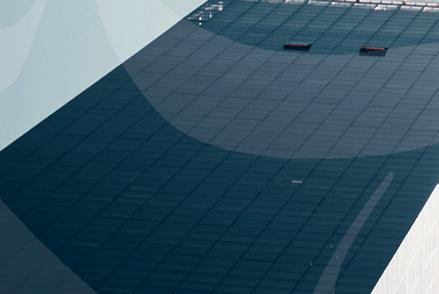
quickly becomes apparent. It is upon this principle that the hadith literature stands, subjecting both narration and the narrator to stringent inspection.
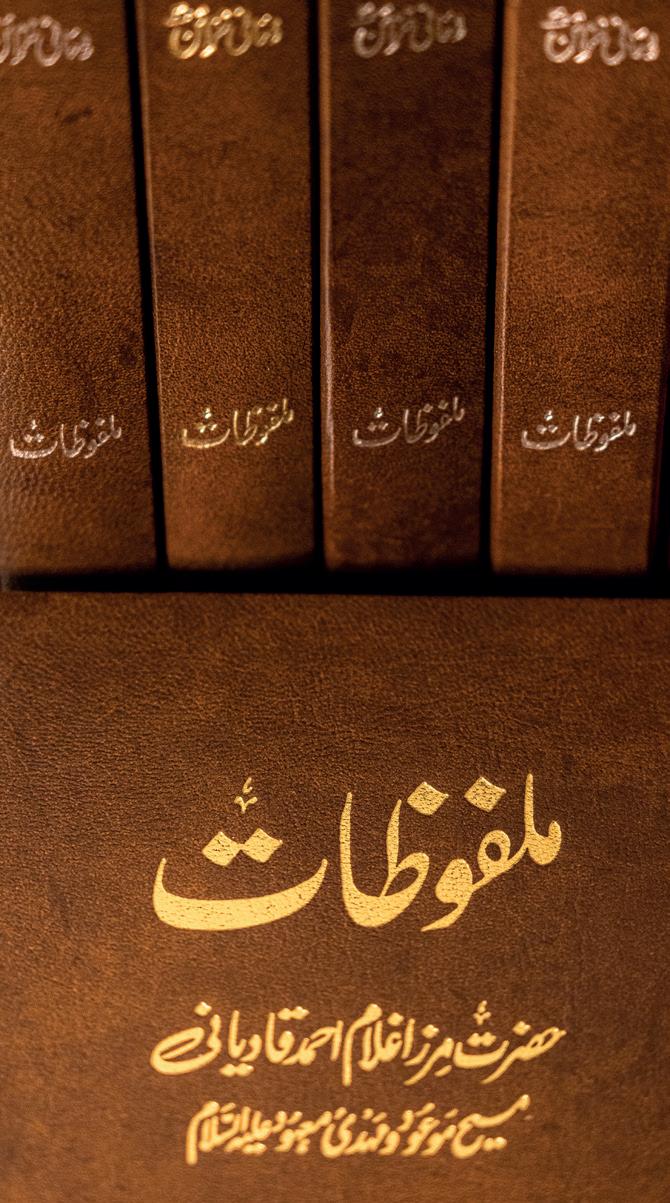
This acts as a shield against fake news. Each time we see a news article, we must think to ourselves: Who wrote this? How reliable is the source? If we started doing this instead of merely accepting a screenshot, audio clip, or news report at face value, fake news would not be such a pandemic – or infodemic







The Cambridge Dictionary defines an infodemic as “A situation in which a lot of false information is being spread in a way that is harmful”. With Covid-19 still not over, the words of WHO director-general Tedros Adhanom Ghebreyesus still stand true today: “We are not just fighting an epidemic, we are fighting an infodemic.”
In a study published in The Psychology of Learning and Motivation, researchers advise that the “source” of any information should always be researched. For example, if a chef gives advice on cancer, we should immediately realise this is outside his area of expertise. In this way, when the original source of any information is uncovered, the truth will often follow. (The Psychology of Learning and Motivation, Volume 71)
This is a clear example of the Islamic principle in motion. Researchers are reaching conclusions that Islam drew centuries ago.
(Romaan Basit, Ahmadiyya Archive & Research Centre)
Ahmadiyya Heritage Month and flag hoisting ceremony
Syed Mukarram Nazeer Canada Correspondent
The city of Brampton acknowledged the invaluable contributions rendered by Jamaat-e-Ahmadiyya and proclaimed the month of July as the Ahmadiyya Muslim Heritage Month. The Mayor of Brampton, Patrick Brown, announced this at the Mubarak Mosque, during the Canada Day celebrations on 1 July 2023.

On the occasion of Jalsa Salana Canada 2023, the Mayor presented Amir Jamaat Canada, Lal Khan Malik Sahib, with the official proclamation. The proclamation celebrated Jamaat-e-Ahmadiyya’s heritage and its invaluable contributions to society.
To celebrate Ahmadiyya Muslim Heritage Month, a special event was held on 24 July 2023, at Brampton City Hall.
The event started with the recitation from the Holy Quran and its English translation. Territory Acknowledgement was next, recognising the traditional territory of the Indigenous people who called the land home before the arrival of settlers and, in many cases, still do.
Secretary Umur-e-Kharijiyya Jamaat

Canada, Asif Khan Sahib, delivered the opening remarks, thanking the City of Brampton for their recognition. Mayor Brown expressed his gratitude and appreciation for Jamaat Canada’s contributions to the community.
A number of Brampton’s politicians were also present. Member of Parliament (Federal) Sonia Sidhu and Member of Provincial Assembly Amarjot Sandhu, each gave a speech acknowledging the significant impact of Jamaat’s efforts in Canada and particularly in the City of Brampton.
Local Amir Brampton West Imarat, Abdul Jabar Zafar Sahib, extended a vote of thanks to the Mayor of Brampton and all the distinguished guests. Local Amir Brampton presented the Mayor of Brampton with a model of Minarat-ulMasih as a token of appreciation.
As the event neared its conclusion, all attendees gathered outside the city hall for the flag-raising ceremony. Mayor Patrick Brown proudly raised the Liwa-eAhmadiyyat.
More than 400 guests were present at the event.
Friday 18 August 2023 | AL HAKAM 2
Photo courtesy of Suhaib Ahmad
Your opinion matters! Info@alhakam.org Write to Al Hakam at
Dopamine rush Understanding the basics
Dr Hamaad Muin Ahmad Junior Doctor, UK
We have all fallen victim to satisfying our demanding dopamine receptors for that quick dopamine hit. Be it swiftly checking our mobile phones to see if we have received a text or email, switching on Netflix when lounging around at home, or even snacking on a sweet treat; dopamine drives all this. It is a reward neurotransmitter and plays a primary role in reward-motivated behaviour.
However, it must be understood that dopamine is not at all negative. In fact, dopamine is what has helped our species survive for millennia. Early humans were driven by dopamine to track and hunt their prey for endless miles and hours for basic survival. Ultimately, dopamine is what drives a myriad of organisms in pursuit of anything, healthy or not.
Of course, with evolution come technological advancements, and with that comes easier accessibility for the performance of daily tasks or seeking entertainment.
Comparing humans today in 2023 to early humans who lived thousands of years ago, there is a drastic difference in dopamine access. With a few clicks of a remote, swiping of a phone, or opening of a cupboard to find a bar of chocolate, we now have access to dopamine hits and peaks that otherwise used to come every few days or weeks in early humans; back then, one successful hunting trip of game meat would allow peace of mind for a whole week or two, depending of course on how the meat was rationed.
We are now in complete contrast to this. Today, we live in an era of ‘dopamine overdose’.
And now, with the sheer advancement in technology, such as the emergence of Artificial Intelligence (AI), we are slowly escaping the long, gruelling hours of writing an essay or an article by simply asking AI to write it for us. Even while writing this piece, I am tempted to ask some chatbot to write it for me; however, the benefits of delayed gratification or delayed dopamine release are far more beneficial for our brain.
One may question, well, what is the harm in that? What is the harm in having easy access to satisfy our dopamine hits? As long as I am happy, right? Well, why is it that today, humans (especially those living in Western countries) are unhappier than ever before? Furthermore, why is it that researchers such as Dr Laura Marie EdingerSchons, a psychologist from the University
of Mannheim, have found that Muslims experience the ‘highest life satisfaction’?
(www.apa.org/news/press/releases/2019/04/ greater-life-satisfaction.html) Indeed, there are reasons for this.
Before we proceed further, it is important to understand the basics of dopamine. Having a high dopamine drive would make one feel euphoric, energised, and motivated. In contrast, a period of low dopamine causes feelings of tiredness, low motivation, and an inability to concentrate. On Earth, the majority of organisms, from worms to reptiles to mammals, have dopamine as a neuromodulator. These organisms have a dopamine ‘baseline’, which describes the lowest amount of dopamine that is always present and circulating in our system.

Put simply, a dopamine spike will cause an increase in dopamine, thus impacting our mood. Various exogenous factors may multiply dopamine levels by 2 or even by 10. However, a general rule of thumb is that the greater the increase and spike, the deeper the fall in dopamine. So, let’s say you have a piece of chocolate. This will multiply your dopamine by 1.5. Following this, when the spike has ended, your dopamine will decrease in proportion to how high and fast
it increased, and you will begin to feel the effects of low dopamine. Ultimately, what goes up must come down.
In our synapses (the microscopic space between our neurons), the vesicles that contain dopamine are limited. An environmental factor that brings about a requirement for dopamine will release these dopamine-contained vesicles into the synaptic cleft. Constantly fulfilling your dopamine levels and getting those highs ultimately places you in a position where your synaptic dopamine is depleted and you begin to feel low. Your motivation, focus, and concentration levels then begin to fall.
If a person is constantly fulfilling their dopamine demand, they will begin to feel that their only source of happiness and contentment is whatever was producing that dopamine surge. This leads to a vicious cycle that ultimately leads to discontentment, demotivation, and, in the worst-case scenario, depression.
Another extremely important point is particularly noteworthy. During the undertaking of hobbies or pastimes, if one were to do something that would elicit a dopamine hit while performing this activity, they would dampen that experience, causing
the individual to not enjoy that hobby to the fullest as they would normally do.
Allow me to further explain using an example. Let’s take a gym workout, or any other physical activity for that matter. If one were to use their mobile phone for texting or listening to music or a podcast during the workout, eventually, in the following gym sessions or physical activities, the individual would unconsciously begin to feel empty without their mobile phone or music.
Consequently, in the future, they would not enjoy the hobby they otherwise would without this external factor. This may eventually cause the individual to become numb to their physical activity – an activity which in itself is meant to cause a dramatic increase in dopamine. This example can be applied to any situation in which one would normally find enjoyment that is masked by easy dopamine access.
Acting upon Islamic teachings through prayer and practising moderation can greatly regulate our dopamine release and help regulate our mood and addictions. The beautiful, pristine teachings of Islam teach us how to control ourselves, and thus selfregulate our dopamine levels.
3 AL HAKAM | Friday 18 August 2023
Milad Fakurian | Unsplash
- 24 August This Week in History
A glimpse into the rich history of the Ahmadiyya Muslim Jamaat

18 - 19 August
18 August 2007: On this day, Hazrat Khalifatul Masih Vaa began his journey to France, the Netherlands, and Germany. The delegation departed from the Fazl Mosque and offered Zuhr and Asr prayers at Calais Port. Upon reaching the Baitus Salam mission house in Paris, Huzooraa led Maghrib and Isha prayers. Before leading the prayers, Huzooraa also inspected the mosque that was under construction within
stone for the mosque being constructed in Zurich stands as a testament to the elevated status of women in Islam.”
(Tarikh-e-Ahmadiyyat, Vol. 21, pp. 451-455)
20 - 21 August
20 August 1904: On this day, the Promised Messiahas departed on his journey to Lahore, during the course of which, he delivered the historic lecture now famously known as Lecture
1924, p. 163)
21 August 1949: On this day, Hazrat Musleh-eMaudra addressed a reception held in his honour at the York House in Quetta, Pakistan, on “Islam aur Maujooda Maghribi Nazriay” i.e., Islam and Contemporary Western Ideologies.
For more details, see “The West is recognising the wisdom of Islamic teachings: Hazrat Musleh-e-Maud’s address at a reception in Quetta, Pakistan, 1949” (Al Hakam, 16 December
Maudra reached London’s Victoria Station, where he was received by Ahmadis. On this occasion, Huzoorra also led everyone in a silent prayer. (Tarikh-e-Ahmadiyyat, Vol. 4, p. 446)
23 August 1897: On this day, the court of Captain Douglas, after completing its proceedings, declared the Promised Messiahas not guilty. The Judge dismissed the charges of attempted murder levelled by a prominent Christian missionary, Henry Martyn Clarke. Hazrat Ahmadas was present in court when the verdict was announced. (Tarikh-eAhmadiyyat. Vol. 1, p. 633)
24 August
the premises of the mission house. (Al Fazl International, 7 September 2007, p. 16)
19 August 1962: On this day, Hazrat Nawab Amatul Hafeez Begumra, daughter of the Promised Messiahas, arrived in Hamburg, Germany, during her visit to Europe. At the airport, she was warmly welcomed by Ahmadis living in West Germany. Her visit was prominently featured in major German newspapers.
Chaudhry Abdul Latif Sahib, a missionary at the time, remarked that Hazrat Nawab Amatul Hafeez Begum’sra visit catalysed significant discussions about Islam in the German press. He said that the Christian objection that Islam does not give any status to women was widely refuted.
Chaudhry Abdul Latif Sahib further elaborated, “I specifically emphasised [to the media] that Hazrat Begum Sahiba laying the foundation
Lahore. (Tarikh-e-Ahmadiyyat, Vol. 2, p. 349)
21 August 1924: On this day, during his tour of Europe, Hazrat Musleh-e-Maudra arrived in France. He left Rome, Italy, by train on the evening of 20 August, and arrived in Paris on 21 August at 9am. From there, Huzoorra changed trains and arrived in the French city of Calais at 1:30 in the afternoon. (Tarikh-eAhmadiyyat, Vol. 4, p. 446)
Hazrat Bhai Abdur Rahman Qadianira has written in his diary of this journey:
“The green and lush scenery during the route from Rome to Paris and from Paris to Calais is one that I cannot describe in words. […] Along the way, tunnels came in abundance; however, on the border of Italy and France came a huge tunnel that was 11 miles long and was dug beneath a mountain, half of which was in Italy and the other half in France. (Safar-e-Europe
2022, Issue 248, pp. 14-15)

21 August 1992: Hazrat Khalifatul Masih IVrh established Muslim Television Ahmadiyya (MTA) International. This satellite-based channel broadcast its first programme on this day, 21 August 1992 from London. It started with a weekly one-hour programme broadcasting the Friday Sermon. (Silsila Ahmadiyya, Part 4, p. 871)
21 August 2017: On this day, Hazrat Khalifatul Masih Vaa inaugurated the Baitus Samad Mosque in Giessen, Germany. (“New Ahmadiyya Mosque opened in Giessen by Head of Ahmadiyya Muslim Community”, www. pressahmadiyya.com)
22 - 23 August
22 August 1924: During his 1924 tour of Europe, on this day, Hazrat Musleh-e-
24 August 1899: The Promised Messiah’sas book Sitara-eQaisariya (Star of the Empress) was published in Zia-ul-Islam Press, Qadian, on this day. The Promised Messiahas highlighted the worldly and materialistic advancements and bounties prevailing during the reign of the Queen. (Tarikh-eAhmadiyyat, Vol. 2, p. 61)
24 August 2007: During his Friday Sermon on this day in the Netherlands, Hazrat Khalifatul Masih Vaa addressed the statement of Geert Wilders against Islam, the Holy Quran and the blessed character of the Holy Prophetsa. Geert Wilders had said that in the Holy Quran, Muslims were incited to commit violence against Christians, Jews and apostates. Mr Wilders also demanded a ban on the Holy Quran.
After mentioning the natural calamities that were prevalent in the world, Huzooraa said that the only solution to save the world from these calamities was to turn to God. Huzooraa advised members of the Jamaat that it was their duty to call everyone towards the One God and to convey to them the true teachings of Islam.
Friday 18 August 2023 | AL HAKAM 4
18
Hazrat Khalifatul Masih Vaa addressing guests at the inauguration of Baitus Samad Mosque in Giessen, Germany.
Coming from every distant track
Awwab Saad Hayat
Al Hakam
Mirza Saleem Baig of Hyderabad visits Qadian, 1940
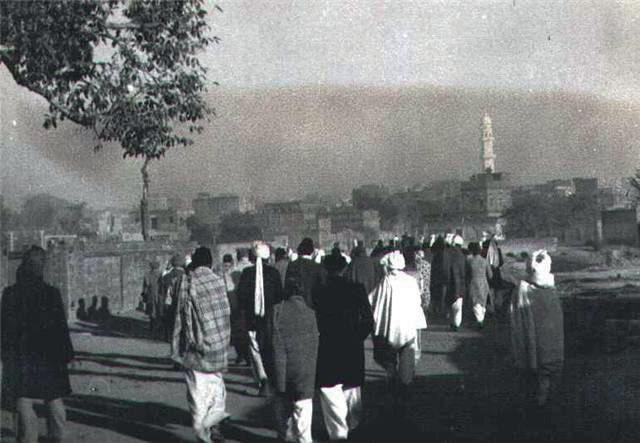
to educating and nurturing the talented children of their community.
Hazrat Sheikh Mahmud Ahmad Irfanira
Sahib, the son of Hazrat Sheikh Yaqub Ali Irfanira, was blessed with the opportunity to serve in various capacities for the Ahmadiyya Muslim Jamaat. He excelled in journalism, authored books, engaged in other intellectual endeavours, and successfully undertook missionary efforts in Arabian lands.
As the circle of acquaintances and close friends of Irfani Sahib was extensive and diverse, he continued spreading the beautiful image of the Ahmadiyya community to righteous souls.
An example of this can be observed through the presence of the honoured guest Mirza Saleem Baig from Hyderabad, who was fortunate to visit Qadian during the blessed era of Hazrat Khalifatul Masih IIra
This esteemed guest, Mirza Salim Baig, a senior officer of the High Court of Hyderabad, Deccan, writes, mentioning his meetings with Hazrat Sheikh Mahmud Ahmad Irfani during his visit to the Levant and Egypt. He recounts:
“The impact of these meetings in Syria and Egypt was such that I had the opportunity to visit the central headquarters of the Ahmadiyya community in Qadian. In December 1940, I reached Qadian, DarulSalam, which is nearly 50 miles away from Amritsar. Although accessible by rail, changing trains at two or three places is necessary. Qadian is a village where, along with the rise of the Ahmadiyya community, the region is also experiencing growth. Roads have been constructed, houses have been built, and gardens and playing fields are being prepared. A hospital, schools, and boarding houses are ready, where teachers from the community are dedicated
“The Ahmadiyya community covers the expenses of the hospital. It is well-organized and equipped with modern instruments and medicines. The boarding house is a spacious and splendid structure, constructed with grand architectural designs in a prominent location. It is connected to the school, and nearby is a vast field where other essential meetings and annual gatherings of the community take place.
“I have observed that the preparations for the annual gathering [Jalsa Salana] were on a very large scale in that field. The efforts of the members in providing accommodations, meals, and necessary supplies for the guests were commendable and worthy of emulation. The distribution of responsibilities, which is a prominent virtue of this community, was carried out with speed and sincerity. Despite not being able to stay until the end of the annual gathering, I witnessed the dedication and sincerity of their organisation and arrangements and became an admirer of their civic-mindedness and devotion.
“I saw the care and orderly arrangement of the cemetery, Bahishti Maqbarah, Qadian, for the first time in my life. Without any ornate embellishments or distinctions of rank, the graves are aligned in a single row. Each grave is marked with a simple headstone inscribed with a brief history of the deceased, the date of their demise, and the registration number of their will. Each grave has this headstone, and there is a reasonable distance between each grave.
“A path is left for each row [of the graves] for people to walk to, and where possible, the cemetery is adorned with shady trees, making it pleasant.
“I found that many people in Qadian have chosen to settle here after leaving their homelands. Additionally, there is a specific Jamaat office that provides loans to its members for constructing houses and collects the amount back in instalments from them.
“The members of this community dedicate their properties to the community as endowments, and their management


is overseen by a special department. The treasury, the arbitration, religious affairs, publication, and organising departments, and the department for endowments and religious dues are established. Each department has its own staff and administrators, all under the supervision of Hazrat Mirza Bashir-ud-Din Mahmud, the Second Khalifa, who personally oversees their services.
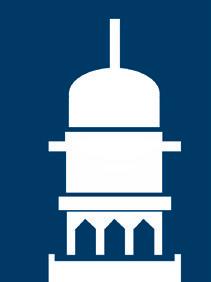
“During the time when I had the opportunity to visit Qadian, Hazrat Khalifatul Masih (the Caliph) was engrossed in writing the exegesis (tafsir) of the Quran. This exegesis, titled ‘Tafsir-e-Kabir,’ was published in Qadian through tireless efforts and with the gracious support of Hazrat Khalifatul Masih. I am immensely grateful that I also received a volume of this ‘Tafsire-Kabir’ during my stay in Hyderabad. I am truly thankful, and may Allah bless Hazrat Khalifatul Masih’s work and grant us the ability to comprehend the divine commandments of the Holy Quran. Ameen.
(Markaz Ahmadiyyat: Qadian, Mahmud Irfani, pp. 462 - 463)
One reason for the fame of this guest, Mirza Salim Baig Sahib, was his passion for travelling to various Islamic countries. Apart from that, this esteemed guest was also skilled in a particular art, which allowed him to identify people based on their handwriting. He had expertise in deciphering handwritten scripts and could assist people in resolving any uncertainties related to legal, judicial, and financial documents. If anyone had doubts about paperwork or legal matters, they would seek his assistance to clarify their concerns and resolve the issues.
In addition to mentioning the esteemed guest’s travels, the upcoming statement provides further information that sheds light on the missionary efforts of the Ahmadiyya community. Mirza Salim Baig is reported to have said:
“In 1924, I had the opportunity to visit Cairo, Egypt, for the first time. I stayed in Cairo while my travelling companions continued their journey to Europe after two days. Approximately a week later, I had the honour of meeting Mahmood Ahmad Sahib Irfani in Cairo. Our shared nationality and some other mutual acquaintances united us in such a way that I started spending most of my time with Mahmood Ahmad Sahib Irfani. He was a missionary of the Ahmadiyya community in Cairo and was diligently carrying out his mission among the Egyptians. Despite being a foreigner, he managed to create a positive impression
among the Egyptian dignitaries and held gatherings with renowned and responsible personalities. Thanks to him, I had ample opportunities to explore Cairo and its way of life. Moreover, I kept witnessing the efforts of his mission, for which he was dedicated as a missionary.
“Under Mahmood Ahmad Sahib Irfani’s leadership, I also observed the missionary endeavours of the Ahmadiyya community in Palestine and Syria (Sham).
“In 1930, I had the opportunity to visit Cairo once again, and I was fortunate to find Hazrat Irfani Sahib present there. His mission was exceptionally successful, and this meeting became a renewal of unity for me. It provided me with numerous occasions to delve into the implementation of the mission, its establishment, the sincerity of the missionaries, and the impact of their efforts. I travelled to various places, such as Palestine, Syria, Istanbul, and Berlin, where I witnessed the organisation and endeavours of the Ahmadiyya community and was truly impressed by their dedication.
“I sincerely admit that everywhere I went, I observed the efforts of the Ahmadiyya missionaries, their adherence to Islamic traditions, and their commitment to the community. The most significant virtue of the Ahmadiyya community is their unity in action and adherence to the commands of their Imam. Its members never overlook the motto of Islam or the principles of Islam under any circumstances and are not unaware of their primary duties and responsibilities. Their perspective is evident in their speeches, writings, and interactions, where they subtly indicate and fulfil their tasks with dedication. They endure hardships, leave a positive impression on non-Muslims, and hold their responsibilities as preachers with distinction.
“In 1930, Mahmood Ahmad Sahib Irfani published a newspaper called ‘Islami Dunya’ (Islamic World) from Cairo in the Urdu language. This newspaper contained both text and images, and it was used to disseminate Islamic news with a comprehensive and detailed approach in Urdu. Unfortunately, unavoidable circumstances led to the discontinuation of its publication, and the newspaper ceased to exist.
“It is regrettable that ‘Islami Dunya’ could not continue its publication due to certain compelling reasons. Nonetheless, during its circulation, it also featured a section on my travels.” (Markaz Ahmadiyat: Qadian, Hazrat Sheikh Mahmud Ahmad Irfanira, pp. 461-462)
5 AL HAKAM | Friday 18 August 2023
A series looking at the high standard of morals of the Promised Messiahas, his Khulafa and the hospitality of the Ahmadiyya Muslim Community when receiving visitors
Old photo of Qadian | Image: Library
al-Jāmi‘,
Names of Allah 78-90
‘Call on Him by these’
78. Yā Jāmi‘ - O Gatherer! - عماج اي
Meaning
The root of jāmi‘ means to collect or gather together. Al-Jāmi‘ means The Collector of created beings for the Day of Reckoning, or the One who combines things of similar or contrary natures in existence. (Lane’s Lexicon, Root: عمج Entry: عماج
)
Similar names
While the name al-Hasīb (The Reckoner) describes reckoning in this world and the next, the name al-Jāmi‘ (The Gatherer) brings to mind the reckoning of mankind altogether in the hereafter. (Lisan al-‘Arab, Ibn Manzur, Root:
Use in Prayer
The name al-Jāmi‘ (The Gatherer) brings to mind the day when Allah Almighty will bring together people of all eras and all lands. Being examined is difficult, but it becomes more difficult if it is held before a gathering. (The Holy Quran with English Translation and Commentary, Āl-e-‘Imrān 3:10, p. 459) When we cannot tolerate
being humiliated in front of a small gathering in this world, we will not be able to bear humiliation in front of a gathering of all mankind. (Haqāiq al-Furqān, Āl-e‘Imrān 3:10, Vol. 1, p. 449) When we say Yā Jāmi‘ (O Gatherer!), we pray that Allah Almighty covers our faults from being seen by anyone else.
The name al-Jāmi‘ (The Gatherer) brings to mind our innate awareness of how we are seen and how we compare with others. If our grade in a class is 70%, it feels one way if we don’t know anyone else’s grade. That 70% feels different if we find out everyone else in the class got 8090%, and that same 70% feels very different if we find out everyone else got 50-60%. When we say Yā Jāmi‘ (O Gatherer!), our competitive spirit is motivated to extend beyond just the circle of people we know, and we pray that we excel among all mankind in gaining nearness to Allah Almighty.
79. Yā Muqaddim - O He Who Brings Forward! - مدقم اي
80. Yā Mu’akhkhir - O He Who Keeps Back! -
Meaning
The root of muqaddim means to put forward, to make foremost, to advance, or to promote. AlMuqaddim is He who advances things and puts them in their places, He who puts forward, or He who promotes. The root of mu’akhkhir means to make something go back, to place behind or after or last, or to postpone or delay. AlMu’akhkhir means He who postpones things and puts them in their places, He who keeps back, or He who degrades. (Lane’s Lexicon, Root: ر�ا
Entry: ر�ﺆملا ،ر�أ, Lane’s Lexicon, Root: مدﻗ
Entry: مدﻗ)
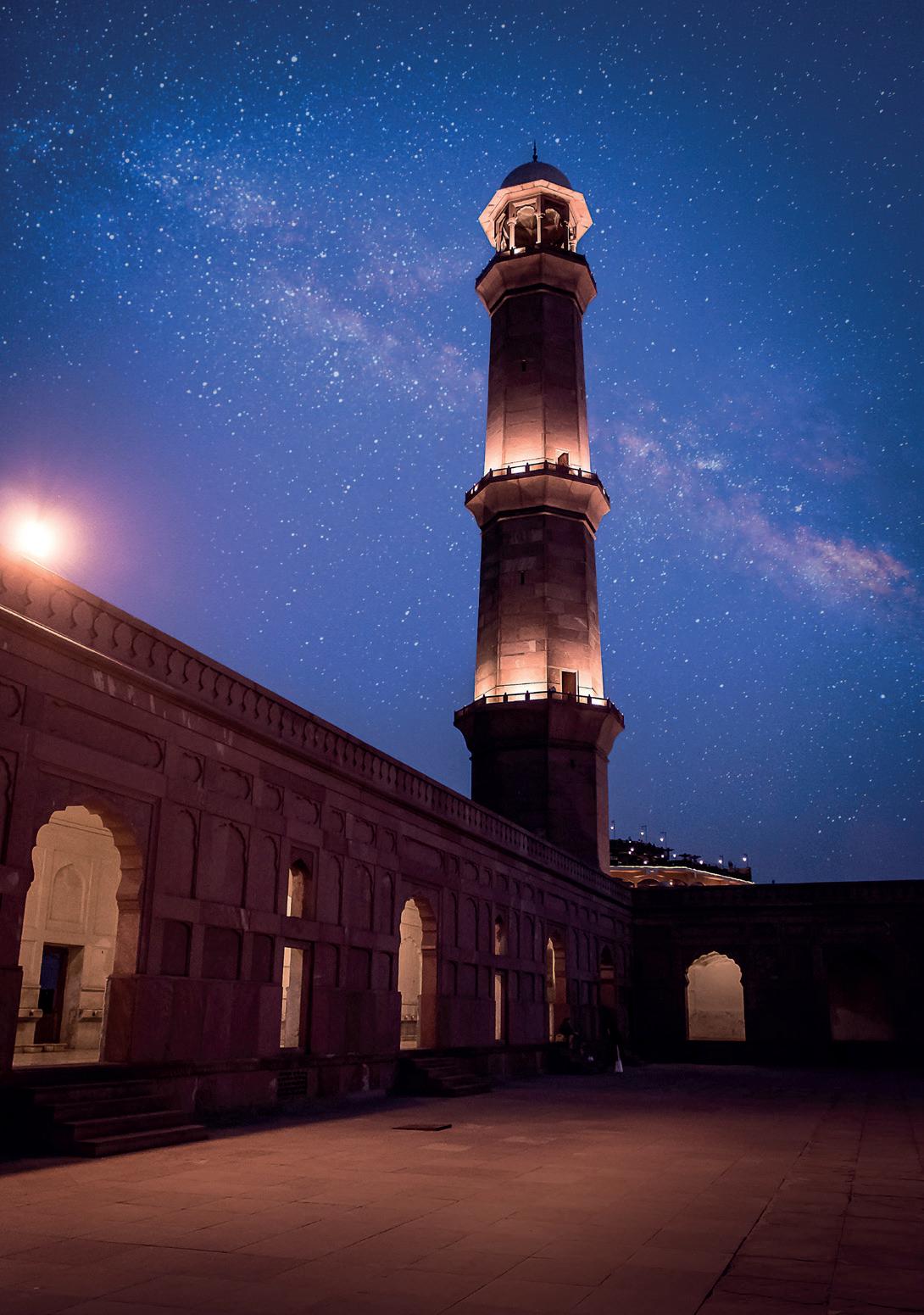
Similar names
Al-Muqaddim (He Who Brings Forward) and al-Mu’akhkhir (He Who Keeps Back)
al-Hamīd
are opposites.
Al-Muqaddim (He Who Brings Forward) and al-Mu’akhkhir (He Who Keeps Back) are sometimes interpreted as meaning al-Awwal (The First) and al-Ākhir (The Last). (‘Umdat al-Qari, Al-‘Ayni, Kitab at-tahajjud, Bab at-tahajjudi bi l-layl, See
Use in Prayer
The names al-Muqaddim (He Who Brings Forward) and al-Mu’akhkhir (He Who Keeps Back) describe how Allah Almighty places some people ahead or behind others in rank or dignity. We are naturally sensitive to what our rank is compared to others. For example, being held back a year in school is a painful setback for a student, and being promoted at work is a euphoric experience for an employee. Being promoted or demoted is so significant because we are social creatures who see ourselves as relative to others. This reality is just as true in spirituality.
The names al-Muqaddim (He Who Brings Forward) and al-Mu’akhkhir (He Who Keeps Back) bring to mind how Allah Almighty brings some people nearer to Him and makes others distant. (The NinetyNine Beautiful Names of God, al-Ghazali, pp. 132-133; Kashf al-Ma’na ‘an Sirr Asma Allah al-Husna, Ibn Arabi, (71, 72) al-Ism: al-Muqaddim, al-Mu’akhkhir) We don’t just want to be close to Allah Almighty; we naturally want to be closer than other people. When we say Yā Muqaddim (O He Who Brings Forward!) and Yā Mu’akhkhir (O He Who Keeps Back!), we pray that Allah Almighty promotes us in rank and grants us nearness to Him, and saves us from being demoted in rank and becoming distant from Him.
The Holy Prophetsa prayed, “Grant me forgiveness for the faults that I made in the past and those that I may commit in the future, whether done in privacy or publicly. You are the One who brings forward (alMuqaddim) or puts back (al-Mu’akhkhir).
There is no god but You.” (Sahih al-Bukhari, Kitab at-tahajjud, Bab at-tahajjudi bi l-layl)
81. Yā Sabūr - O Patient! - روبص
Meaning
The root of sabūr means restraint and patience. Sabūr means having great patience. As-Sabūr means The Clement, or Forbearing, who does not hurry in inflicting retribution on the disobedient.
(Lane’s Lexicon, Root: ��ص Entry: رباص ،��ص)
Similar names
While al-Muntaqim (Inflictor of Retribution) describes the retribution of Allah Almighty, as-Sabūr (The Patient) describes how retribution only comes after a long period of forbearance. (Lisan al‘Arab, Ibn Manzur, Root: ��ص, See “ ي� :��ص

ماقتنالاب”)
This name is also mentioned under alHalīm (The Forbearing).
Use in Prayer
The Holy Prophetsa said, “None is more patient (asbar) than Allah against the harmful words He hears from the people: They ascribe children to Him, yet He bestows upon them health and provision.” (Sahih al-Bukhari, Kitab at-tawhid, Bab qawlillahi ta‘ala innallaha huwa r-razzaqu dhu l-quwwati l-matin) If Allah Almighty were to punish us instantly for our wrongdoing, He would not have spared us, but He gives us respite until an appointed term so that we can make amends. (Holy Quran, Surah al-An’am, Ch.16: V.62) When we say Yā Sabūr (O Patient!), we express gratitude to Allah Almighty for delaying the retribution we may deserve, and we pray that He gives us the opportunity to repent and make amends before that punishment may come.
82. Yā Halīm - O Forbearing!میلح اي
Meaning
The root of halīm means managing one’s temper on the occasion of anger. It means forgiving and concealing offences and being patient. Halīm means having forbearance or clemency. Al-Halīm means The Forbearing, or Clement, or He Whom the disobedience of the disobedient does not anger, but Who has appointed to everything a term to which it must finally come. (Lane’s Lexicon, Root: ملح Entry: ،ملح میلح)
Similar names
As-Sabūr (The Patient) and al-Halīm (The Forbearing) are synonymous. The difference is that a sinner is not as secure from punishment in the meaning of asSabūr (The Patient) as he is secure in the meaning of al-Halīm (The Forbearing).
(Lisan al-‘Arab, Ibn Manzur, Root: ���) AsSabūr delays punishment until an appointed term, whereas al-Halīm additionally has the meaning of forgiving sins. (Sharh al-Nawawi ‘ala Muslim, alNawawi, Kitab Sifat al-Qiyāmah, Bab Lā
Friday 18 August 2023 | AL HAKAM 6
Rizwan Khan Missionary, USA
،عمج
عمج, See “ نبا لاﻗ ؛عماجلا باﺴحلا مویل ﻖﺋا�ﺨلا عمجي يذلا وہ :�یث�لا”)
al-Muqaddim, al-Mu’akhkhir, as-Sabūr, al-Halīm, al-Ghāfir, al-Ghafūr, al-Ghaffār, al-‘Afuww, at-Tawwāb, ash-Shākir, ash-Shakūr,
ر�ﺆم اي
لو�لا تنأ :نیتلا نبا لاﻗ :ر�ﺆملا تنأو مدقملا تنأ: :هلوﻗ ر��لا تنأو”) Al-Mu’akhkhir (He Who Keeps Back) and al-Ākhir (The Last) come from the same root.
“
اي
ةاﺼعلا لجاعی ال يذلا وہ ،سدقتو
روبﺼلا
هللا ءامسأ
ىلاعت
:ىلاعت
Nouman Younas | Unsplash
Ahada Asbar)
The meanings of “forgiveness” and “mercy” in al-Halīm (The Forbearing) are synonymous with al-Ghafūr (The Most Forgiving) and ar-Rahīm (The Merciful). (Friday Sermon, 14 Mar 2008, Khutbat-eMasroor, Vol. 6, p. 110)
Use in Prayer
The name al-Halīm (The Forbearing) creates both hope and fear in our hearts because it reminds us that Allah Almighty is forgiving while fully having the power to punish. When we say Yā Halīm (O Forbearing!), we pray that Allah Almighty delays the consequences of our wrongs through His mercy, and that He accepts our repentance through His forgiveness.
83. Yā Ghāfir - O Forgiver! - رفاغ اي
84. Yā Ghafūr - O Most Forgiving!
- روفغ اي
85. Yā Ghaffār - O Oft-Forgiving!
- رافغ اي
Meaning
The root of ghāfir means to cover or conceal. It also means to forgive or pardon, or preserve someone from being touched by punishment. Al-Ghāfir means He who forgives and covers sins or offences. The words ghafūr and ghaffār are intensive forms of ghāfir. (Lane’s Lexicon, Root: رفغ Entry: رفاغ ،رفغ)
The name al-Ghāfir (The Forgiver) describes the basis of forgiveness. The name al-Ghafūr (The Most Forgiving) is in the intensive fa’ūl ( لوعف) form. This form describes the excellence and completeness of the quality in the root meaning. alGhafūr describes the perfection and the highest level of forgiveness. It describes forgiveness in relation to many offences, because someone who forgives only one kind of offence is not ghafūr. The name alGhaffār (The Oft-Forgiver) is in the intensive fa’’āl ( لاعف) form. This form describes the multiplicity and frequency of the action described in the root meaning. al-Ghaffār describes repeated forgiveness. It describes forgiving all of someone’s offences time after time, because one who forgives all of someone’s offences only the first time, but does not forgive those who repeatedly commit offences, would not be called ghaffār. (The Ninety-Nine Beautiful Names of God, al-Ghazali, pp. 25, 100-101)
Similar names
This name is also mentioned under alHalīm (The Forbearing), al-Afuww (The Efacer of sins), at-Tawwāb (The OftReturning), and ash-Shakūr (The Most Appreciating).
Use in Prayer
The true meaning of istighfār (seeking forgiveness) is to pray that no human weakness be manifested. The root of istighfār is ghafara, which means to cover up. Istighfār means asking that God cover up our natural weaknesses with His power. This meaning includes covering up a sin that has been committed, but the true meaning is that God should safeguard us against our natural weakness and bestow on us power, knowledge, and light. (Essence of Islam, Vol. 2, pp. 241-242) Thus, only one aspect of istighfār is to cover what we have
already lost; its primary application is to prevent us from missing what we can gain. When we pray to Allah Almighty by means of the names al-Ghāfir, al-Ghafūr, and alGhaffār, we don’t just pray for our past sins to be forgiven, we primarily pray that Allah Almighty covers our weaknesses and saves us from future loss.
When we think of a particular offence or mistake, we say Yā Ghāfir (O Forgiver!) and pray that Allah Almighty forgive that offence.
When we think of all our shortcomings and offences, we may feel overwhelmed by how far we fall short. At that time, the name al-Ghafūr (The Most Forgiving) reassures us that Allah Almighty can forgive every sin if we are sincere. We say Yā Ghafūr (O Most Forgiving!) and pray that Allah Almighty forgives all our shortcomings. Allah Almighty says, “O My servants who have committed excesses against their own souls! Despair not of the mercy of Allah, surely Allah forgives (yaghfir) all sins. Verily He is Most Forgiving (al-Ghafūr), Merciful.” (Holy Quran, az-Zumar 39:54)
When we think of how we keep falling into the same faults again and again, we may feel despair and think we are too sinful to ever be forgiven. At that time, the name al-Ghaffār (The Oft-Forgiving) reassures us that as long as we keep trying, Allah Almighty will keep forgiving us no matter how great our sins are. When we say Yā Ghaffār (O Oft-Forgiving!), we pray that Allah Almighty forgives all our sins again and again. However, a prerequisite for repeated forgiveness is that we are sincere and are continuously making progress. Allah Almighty says, “But surely I am OftForgiving (Ghaffār) to those who repent and believe and do good deeds, and then stick to guidance.” (Holy Quran, TaHa 20:83)
86. Yā ‘Afuww - O Eraser of Sins! - وفع اي
Meaning
The root of ‘afuww means to efface or erase. al-‘Afuww means The one who passes over sin and leaves punishing it. (Lisan al-‘Arab, Ibn Manzur, Root: افع; Lane’s Lexicon, Root: وفع Entry: وفع ،وفع) Similar names
The root of ‘afuww means to completely wipe something clean. ‘Afuww means turning away as if one has not seen a sin, despite having seen it being committed.
The name al-Ghafūr (The Most Forgiving) goes one stage beyond al-‘Afuww (The Eraser of Sins) and signifies that when a person commits a wrong to the extent that it warrants punishment, then the name al-Ghafūr comes into effect and saves the person if he seeks forgiveness. (Friday Sermon, 13 Jan 1984, Khutbat-e-Tahir, Vol. 3, pp. 15-16) When contrasted, al-‘Afuww applies to wrongs that can be overlooked, and pardoning them means erasing them. Al-Ghafūr applies to wrongs that cannot be overlooked, and forgiving them means saving us from their punishment.
In the Holy Quran, we are taught to pray, “and efface (wa’fu) our sins, and grant us forgiveness (waghfir) and have mercy (warham) on us.” (Holy Quran, al-Baqarah 2:287) Here, we ask for progressively greater blessings. First, we ask Allah Almighty to pardon (Afuww) our negligence, then we
ask Him to forgive (Ghafūr) our errors, then we ask Him not just to remove negatives but to show positive mercy (Rahīm) to us.
(The Holy Quran with English Translation and Commentary, 2:287, p. 441)
Use in Prayer
The Holy Prophetsa taught us to pray, كنإ مهللا ينع فعاف وفعلا بحت وفع “O Allah, You are the Pardoner (‘Afuww), you love pardoning, so pardon me.” (Sunan Ibn Majah, Kitab addu’a, Bab ad-du’a bil-‘afwi wal-‘afiyah)
When we say Yā ‘Afuww (O Eraser of Sins!), we pray that Allah Almighty erases our sins and overlooks them as if we had never done them.
87. Yā Tawwāb - Oft-Returning -
sequentially connected.
Use in Prayer
Our turning to Allah Almighty is with remorse and humility, and Allah’s turning to us is with mercy and forgiveness. The word taubah (repentance) means ‘returning,’ which is why Tawwāb (OftReturning) is a name of Allah. This means that when a person leaves sin and turns to Allah Almighty with a sincere heart, Allah turns even more to him. (Essence of Islam, Vol. 2, p. 239) When we say Yā Tawwāb (Oft-Returning), we humbly express remorse for our faults and ask Allah to accept our repentance and turn to us with His mercy and forgiveness.
The Holy Quran teaches us to pray, بتو
“And turn (tub) to us with mercy; for You are Oft-Returning (atTawwāb) and Merciful.” (Holy Quran, alBaqarah 2:129) The Holy Prophetsa would frequently pray, روفغلا باوتلا تنأ كنإ ىلع بتو ي رفغا بر “O my Lord, forgive me, and turn (tub) to me. Verily, You are the Oft-Returning (atTawwāb), the Most Forgiving.” (Jami‘ atTirmidhi, Kitab ad-da’wat ‘an rasul-il-lahisa, Bab ma yaqulu idha qama minal-majlis)
88. Yā Shākir - O Appreciating! -
89. Yā Shakūr - O Most Appreciating!
Meaning
باوت اي Meaning
The root of tawwāb, when applied to a person, means his returning to Allah from sin, or repenting. When applied to Allah Almighty, it means His returning to a person with forgiveness, or accepting his repentance. At-Tawwāb means He who returns forgivingly towards the servant who returns to Him. (Lane’s Lexicon, Root: بوت Entry: باوت ،بوت)
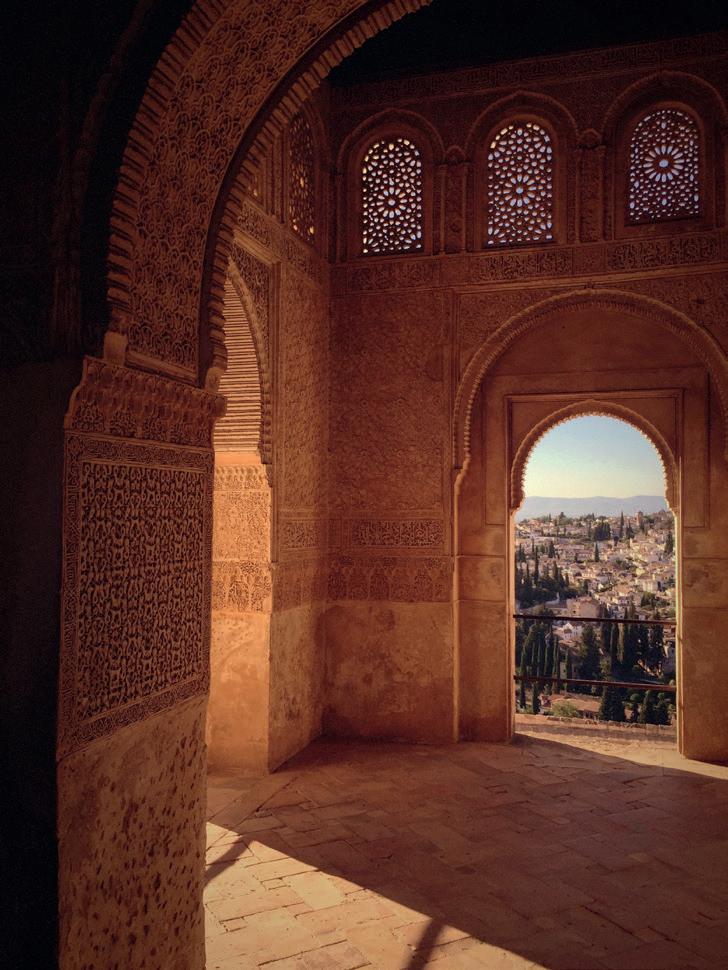
Similar names
Both al-Ghafūr (The Most Forgiving) and at-Tawwāb (The Oft-Returning) have the meaning of forgiveness because Allah’s acceptance of our repentance is a result of His forgiveness. (Lisan al-‘Arab, Ibn Manzur, Root: بوت, See: “ هیلع داع يأ هیلع هللا باتو ةرفغمـلاب”) The name al-Ghafūr is broader because Allah Almighty continuously covers our weaknesses and forgives us even if we don’t seek forgiveness, but at-Tawwāb is more specific because it is only in response to our returning to Him. (Friday Sermon, 10 Feb 1984, Khutbat-e-Tahir, Vol. 3, p. 86)
From one point of view, seeking forgiveness (istighfār) has priority over repentance (taubah). Seeking forgiveness (istighfār) is the help and strength we obtain from Allah, and repentance (taubah) means standing on our own feet. The strength for repentance (taubah) is acquired after seeking forgiveness (istighfār). Without seeking forgiveness (istighfār), the strength for repentance (taubah) dies. (Essence of Islam, Vol. 2, p. 245) The blessings in the names al-Ghafūr (The Most Forgiving) and at-Tawwāb (The Oft-Returning) are
The root of shakūr means to thank, praise, or be grateful. Shukr (appreciation) is of three kinds: with the heart, with the tongue, and with action. When used for Allah, shukr (appreciation) means His commending a person, or forgiving him, or regarding him with contentment, or rewarding him. Ash-Shakūr means He who gives large rewards for small works. (Lane’s Lexicon, Root: ركش Entry:
Like the words ghafūr and ghāfir, shakūr is the intensive form of shākir. The name ashShākir (The Appreciating) describes the basis of appreciating. The name ash-Shakūr (The Most Appreciating) is in the intensive fa’ūl ( لوعف) form. This form describes having excellence and completeness of the quality in the root meaning. Ash-Shakūr describes the perfection and highest level of appreciation.
In the Holy Quran, when the name Shākir (Appreciating) is mentioned, it is paired with the name ‘Alīm (All-Knowing) (Holy Quran, 2:159, 4:148), and when the name Shakūr (Most Appreciating) is mentioned, it is paired with the names Ghafūr (Most Forgiving) and Halīm (Forbearing). (Holy Quran, 35:31, 35:35, 42:24, 64:18) This indicates that, when contrasted, the name ash-Shākir emphasises the meaning of appreciation with the heart, which, when applied to Allah Almighty, means appreciation in His knowledge. The name ash-Shakūr emphasises the meaning of appreciation with action.
Similar names
One aspect of ash-Shakūr (The Most Appreciating) has the meaning of “forgiveness,” which is synonymous with al-Ghafūr (The Most Forgiving). (Lisan al‘Arab, Ibn Manzur, Root: ركش, See, “ :روكشلاو
7 AL HAKAM | Friday 18 August 2023
میحرلا باوتلا تنا كنا انیلع
ركاش اي
- روكش اي
روُكَش ،ركش)
Continued on next page >>
Isak Gundrosen | Unsplash
This name is also mentioned under alHamīd (The Praiseworthy).
Use in Prayer
The name ash-Shakūr (The Most Appreciating) reminds us that the reward for our efforts is never wasted. Rather, we are liberally rewarded for the most insignificant action. When we say Yā Shakūr, we acknowledge that our actions are insignificant, and we pray that Allah accepts our unworthy efforts.
90. Yā Hamīd - O Praiseworthy! -
Meaning
The root of hamīd means praise. Al-Hamīd means He who is praised, or praiseworthy. (Lane’s Lexicon, Root: دمح Entry: دیمح ،دمح)
The intensive fa’īl ( لیعف) form of hamīd describes permanent possession of the quality of being praiseworthy. For example, a person is only mahmūd (praised) for as long as people praise him, but hamīd (praised) describes being praiseworthy in essence, whether people praise him or not. This is similar to how a person is only mahbūb (loved) for as long as people love him. However, the word habīb (loved), in the intensive fa’īl ( لیعف) form, describes the intrinsic quality of being worthy of love, whether people love him or not. (Jalā’ alAfhām, Ibn Qayyim, Fasl 9)
Similar names
The roots of ash-Shakūr (The Most Appreciating) and al-Hamīd (The Praiseworthy) are synonymous. Shukr (appreciation), when used about a person, means thankfulness for favours, whereas Hamd (praise) not only means thankfulness for favours, but also means praise for the intrinsic beauties of the praised object.
(Tafsir-e-Kabir, Vol. 1, p. 18) ash-Shakūr describes how Allah Almighty praises our actions, whereas al-Hamīd describes how Allah Almighty is praised by us, and also how He is intrinsically praiseworthy.
This name is also mentioned under alMajīd (The Ever-Noble).
Use in Prayer
The worship of Allah Almighty must be from a passion and a strong attraction. Our hearts cannot be filled with love for Allah Almighty unless we know He possesses such perfect excellences that spontaneously inspire the heart with praise. Praise is inspired by two qualities, the perfection of beauty and the perfection of beneficence. When we know that Allah Almighty combines both these excellences, our heart melts and yearns for Him with fervent devotion. By teaching us to say Alhamdulillah (all praise belongs to Allah), The Holy Quran aims at impressing these two excellences of Allah Almighty on us so that we are drawn to Him and worship Him with fervent devotion and yearning.
(Ayyam-us-Sulh, Ruhani Khazain, Vol. 14, p. 247) The name al-Hamīd (The Praiseworthy) brings to mind the beauties of Allah Almighty and inspires a yearning to worship Him. When we say Yā Hamīd (O Praiseworthy!), we worship Allah Almighty with that attraction and pray that He shows us more of His beauty.
A journey fueled by faith and pedal power
Ahmadis cycle from Ireland to attend Jalsa Salana UK 2023
Shahzad Malik Ireland Correspondent
Eleven members of the Ahmadiyya Cycling Club (ACC) Ireland cycled over 650 km to attend Jalsa Salana UK 2023. The group of cyclists, along with their two supporting vehicles, left the Dublin mission house Bait-ul-Ahad on 23 July 2023, and arrived at Hadeeqatul Mahdi on 27 July.
The Ahmadiyya Cycling Club in Ireland was initially set up in 2021 with the view to introducing this beneficial activity to all Jamaat members. Shortly after, the idea of incorporating a charity cycle into the already existing annual charity walk in Ireland was initiated. Thus began the new task of introducing long-distance cycling to khuddam , getting them trained and well-equipped. Khuddam eagerly signed up to embark on this challenge to raise funds for local charities, and since then, the charity cycle has become an integral part of the Khuddamul Ahmadiyya annual calendar.
Members of the ACC Ireland committee spent countless hours in the build-up to the cycle preparing the route, sharing safety information with cyclists, arranging nutrition, etc. Furthermore, two national training rides were held in County Cork and County Clare in preparation for the cycle to Jalsa Salana UK.
The National President of Jamaat Ireland, Dr Anwar Malik Sahib, led the cyclists in silent prayer as the group began their journey, going through Dublin city alongside the river Liffey, reaching the
port where we boarded the Ulysses Ferry from Dublin Port to Holyhead in Wales. On arrival, the cyclists got back on their bikes and began their journey to the Sadiq Mosque in Rhyl through sunshine, rain, and some wonderful views across the Northern Wales coastline. On arrival at the mosque after a tough day, cyclists were warmly welcomed by the local Jamaat members, who showed great care and hospitality.
The following day brought its own challenges, as the journey consisted of a staggering 194 kilometres to the Darul Barakat Mosque in Birmingham. The long journey was well worth it, as a wonderful reception in Birmingham enabled the cyclists to meet with many local members of the Jamaat and share their experiences. This characteristic was common and was felt at each location we stopped at; the stop at Oxford was no exception. The local members looked after the team very well, and cyclists were even given goody bags to take along for their next step of the journey. Subsequently, the next stop was at Baitul Futuh Mosque, where the team was in for a pleasant surprise. Many local Jamaat members and international guests of the UK Jalsa Salana had gathered to welcome the cyclists by raising slogans and holding up the Irish flag. This is when the Jalsa feelings really began to kick in, with the feelings of tiredness and fatigue after a long day of pedalling quickly evaporating.
After a well-deserved rest in the lively mosque, it was time to embark on the last leg of the journey to reach Hadeeqatul Mahdi. It was the shortest journey in
terms of distance (85 km), but also the most anticipated one. As our group neared the final destination, we were fortunate to be joined by the team of cyclists from Germany. As both groups merged and cycled the last stretch from Country Market, it was a sight to behold for all –Ahmadis and non-Ahmadis alike. The last few minutes of cycling brought with it a great sense of fulfilment and satisfaction, as well as passionate slogans being raised as the white marquees of Jalsa UK came into view. All cyclists were welcomed by Amir Sahib Jamaat-e-Ahmadiyya UK, who appreciated the efforts made and presented gift bags to everyone involved.
In this manner, the group of eleven that began their journey from Ireland, not knowing what lay ahead, reached their destination, covering 650km in distance and over 5000 metres in elevation. This was all in an effort to quench their spiritual thirst by attending the blessed event of Jalsa Salana.
This journey was not free from some setbacks or minor difficulties, but at every moment the cyclists were witness to the help and blessings of Allah the Almighty, which enabled their safe travel. This journey taught us many things, including the importance of unity and brotherhood, the ability to struggle and remain steadfast despite facing difficulties, and not taking blessings for granted. We are extremely thankful to everyone who hosted us throughout our trip and provided us with revitalised spirits to start each day of this great endeavour.
Ahmadiyya Muslim Community holds nationwide
Holy Quran awareness campaign in Sweden
Kashif Virk Missionary, Sweden
In response to the burning of copies of the Holy Quran in Sweden, the Ahmadiyya mission in Sweden held stalls all over the country to promote dialogue and the teachings of the Holy Quran. Following the guidance of Hazrat Khalifatul Masih Vaa, Jamaat Sweden has worked actively for several years to respond to the desecration of copies of the Holy Quran. Tours and stalls have been arranged in more than 90 locations around the country. Copies of the Holy Quran have been placed in hundreds of libraries across Sweden. A campaign has also been launched on social media with the hashtags #FrågaEnMuslim (Ask a Muslim) and #KoranenLär (The Quran Teaches).
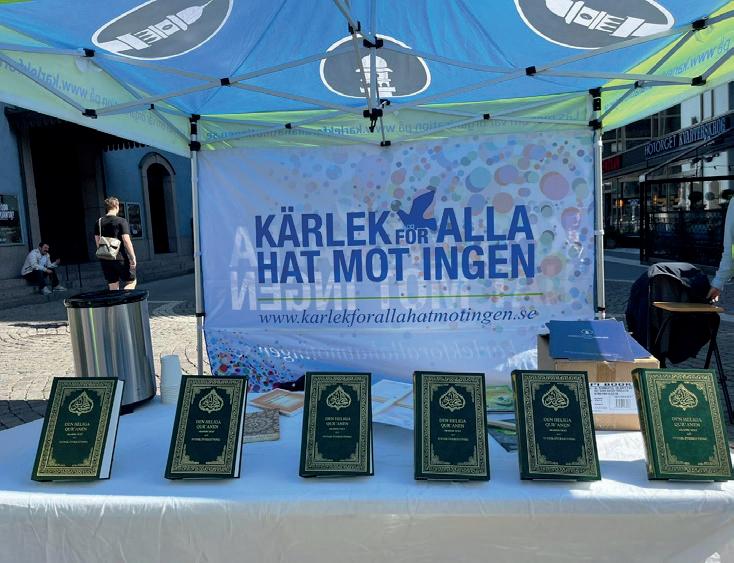
Between 21 and 23 July 2023, Jamaat Sweden arranged stalls in the cities of Stockholm, Gothenburg, Malmö, Kalmar, and Luleå. The stalls attracted hundreds
of visitors who came and asked questions and had dialogue. More than 170 copies of the Holy Quran with the Swedish translation were distributed. Many appreciated Jamaat’s efforts in promoting dialogue and peace.
Among the public in Sweden, many are openly against burning the Holy Quran and think it should not be allowed.
The media outreach was also significant. Two national and three local TV stations covered the event. The stall was also covered by one national and five local radio stations. Seven local newspapers also published news about the event. Other than this, two Swedish-Arab media outlets gave news about the event, which gathered a total of 2.5 million followers online.
The response of the general public was also overwhelming. In Stockholm, a lady came forward with tears in her eyes and said that this is the right way of raising an opinion. On Arab social media, there are
comments such as:
“May Allah reward you”, “May Allah bless you”, “Excellent”, and “All respect”.
Two weeks later, Jamaat Sweden was invited by the Foreign Minister and Social Minister to discuss the recent incidents. At this meeting, I had the opportunity to present the peaceful efforts of Jamaat Sweden to promote dialogue and respect, which was appreciated.
Friday 18 August 2023 | AL HAKAM 8
لامعأ نم لیلقلا هدنع وكزي هنأ :هانعم ،همسا لج هللا تافص نم مهل هترفغم هدابعل هركشو ،ءازجلا مهل فعاضیف دابعلا”)
دیمح اي
<< Continued from
previous page
Photo courtesy of AMJ Sweden
Seal of the Prophets and the Finality of Prophecy A rejoinder to Uri Rubin
Michael LaPine USA
Western academic discussion on the significance of the term “Seal of the Prophets” made a breakthrough in the 1980s with the publication of Yochanan Friedman’s Finality of Prophethood in Sunni Islam (JSAI 7, 1986) and Guy G. Stroumsa’s research, Seal of the Prophets: The Nature of A Manichaean Metaphor (JSAI 7, 1986). Using historical-critical methods, both writers presented a challenge to the world on the significance of the metaphor in Surah al-Ahzab, 33:41. In their view, the notion of “finality” is a post-Quranic idea, and “seal” implies something much richer. The only academic challenge to Friedman to date came from the late Uri Rubin. (Rubin, Uri, The Seal of the Prophets and the Finality of Prophecy: On the Interpretation of the Quranic Surah al-Ahzab, Zeitschrift der Deutschen Morgenlandischen Gesellschaft, Band 164-Heft 1, 2014) Rubin defended the widespread notion that the prophetic seal implies finality. His rebuttal has been cited many times, but there has been no critical feedback on it yet.
Rubin’s central claim is that the case for the “finality” of prophecy is firmly rooted in the etymology of the word “seal.” He begins the discussion by examining the word “musadiqun” (confirmation) and its relationship to “khatam (seal)”. It is to be noted that scholarship has long attested that khatam can have several meanings, including that of confirmation. This fact has made other secular scholars question certain assumptions pertinent to Islamic theologians. Rubin writes, “Muhammad’s description as a Messenger of God and the Seal of the Prophets seems to be a fulfilment of the history of past prophecies.” (Rubin, p. 74) Rubin notes that the term “musadiqun” found in the Quran (such as in Surah Aale-‘Imran, 3:4-5) denotes confirmation of previous revelations. Rubin feels the meaning of “seal” in the Quranic term “Seal of the Prophets” seems to mean more than “fulfilment”. (Ibid., 74) Since musaadiq is used in the Quran to indicate confirmation, he argues, then the seal must have meaning beyond confirmation or fulfilment. It is thus reasoned by Rubin that “seal” cannot be limited to mean “confirmation,” since the term is already used in the Quran to refer to the role of the prophets in confirming previous dispensations.
We have no problem with Rubin’s point that “seal” must connote more than mere confirmation. Extensive use of the term in Biblical literature proves that there is more to the term “seal”. (Analysing ‘the seal’
metaphor in Judeo-Christian literature, www. alhakam.org/analysing-the-seal-metaphorin-judeo-christian-literature/) But why does Rubin choose to ignore the extensive literature on the religious significance of the term and merely derive “finality” from the word?
Rubin claims that “scepticism” (Rubin, p. 75) of the view that the seal (via 33:41) implies finality is based on “Extra-Quranic material” and not on the Quran itself, especially not on the function of the root kh-t-m.” (Rubin, p. 75) In effect, Rubin has proposed a methodology that supposedly relies on the Quran alone. Other items scholars find relevant (Hadith, Bible, and Near Eastern literature) are put aside. Rubin claims that he could derive “finality” purely from the etymology of the word kh-t-m
The dismissal of “extra-Quranic material” is an odd position for an academic. Academic scholars claim they are taking a historical-critical approach to the Quran. The historical-critical approach is a way “to understand the text at hand in the light of views, concepts, and modes of expression current in the historical situation from which it originated, and of events and developments contemporaneous with it.”
(Nicolai Sinai, Historical-Critical Readings of the Abrahamic Scriptures, in Adam J. Silverstein and Guy G. Stroumsa (eds.), The Oxford Handbook of the Abrahamic Religions [Oxford: Oxford University Press, 2015]) The historical-critical method will try to understand an ancient text like the Quran by using sources such as Hadith and other documents pertinent to 6thcentury Arabia. By ignoring “extra-Quranic sources”, Rubin is guilty of not employing the historical-critical method and thereby not engaging in discourse satisfactory to academic standards. Interestingly enough, Rubin’s position puts him in line with certain thinkers who deny the validity of Hadith and sunnah. Not using traditional sources to understand the Holy Quran is a strange approach for an academic.
Ironically, Rubin uses a dictionary in his paper (The Foreign Vocabulary of the Qur’an
by Arthur Jeffery) to back up his claims. Jeffrey’s work uses “extra-Quranic” material. The thesis of Jeffrey’s work was to show how some Quranic words have a non-Arabic origin. How can Rubin claim he is avoiding “extra-Quranic material” when he is doing just that by utilising Jeffrey’s dictionary? We will see more of Rubin’s methodological inconsistencies later. As opposed to the “Quran-only” approach, Khalil Andani argues that the Quran should be used as the primary text (but not the only one) in attempting to understand theological developments. (Academic Talk - Speaking Quran: Revelation in Sunni and Shia Ismaili Islam, Andani, Khalil, April 11, 2017; www. youtube.com/watch?v=w9_csA1hjM0 ) Modern scholarship recognises the Quran as the oldest Islamic document, which gives it priority in understanding the development of Islam. However, it is hard to fathom that an academic would suggest ignoring related material when understanding the Holy Quran.
The main point of Rubin’s argument from etymology is that “seal” in 33:41 must be understood to denote finality because Rubin believes kh-t-m denotes finality in every other case. He writes, “In all the occurrences of this verb in the Quran,” the word seal means “to seal something so that (it) remains closed.” (Rubin, p. 74) The “seal” in 33:41 is not a verb but a noun, and therefore Rubin writes, “The noun ‘khatam’, of which the verb khatama is a derivative, may well stand for a prophet with whom God has sealed (closed up) the universal line of prophetic revelation.” (Ibid., 74) Following this line of argument, Rubin concludes that “Seal of Prophets” must indicate cessation of prophecy if we are to be consistent with the Quran and not rely on outside sources. The line of argumentation for Rubin’s etymology argument raises a lot of questions. Do “all occurrences” of the verb khatama indicate closure? And assuming khatama does indicate “closure”, as a verb, would it mean that the noun variant of the word khatam in Surah al-Ahzab, 33:41, would also necessitate closure? Also, is the type of consistency Rubin is appealing to really congruent with the rich word morphology of the Quran? In other words, are we being true to the text of the Quran by interpreting the seal in 33:41 in the same sense as other variations of the word?
The assertion that the verbal form of kh-t-m as used in the Quran always means “closure” is theologically problematic in the passages at hand. Surah al-Baqarah says, for example, “Allah has set a seal on their hearts and their ears, and over their eyes is a covering, and for them is a
great punishment.” (2:8). A problem with any translation is that the translator may unintentionally misconstrue the meaning. In this case, “seal” appears to be a noun, but it is used as a verb in Arabic. How can we understand the meaning of “seal” above? Is there an actual “seal” on the hearts, as the text seems to say? When the Quran says God sealed the hearts, the meaning is obviously not literal because there is no physical process disrupting blood flow to the heart. The meaning of “seal” is obviously metaphorical. In the other places where the verb “seal” is mentioned (6:46, 36:65, 42:24, 45:23), the Quran also discusses the sealing of hearts, which is also in a metaphorical sense.
Can we understand the Quranic sealing of the hearts to mean that God has “closed” something to the disbelievers? If so, what did God close? A superficial understanding may have the reader believe God closed off his mercy. But Islamic theologians have argued that God has never closed the door of His mercy. When Surah al-Baqarah, 2:8, says that God sealed the hearts of the disbelievers, this is understood as a result of their “willful indifference” to divine laws. (Five Volume Commentary, p. 45-46) The fate of the disbelievers is “sealed” in that their spiritual failure is assured.
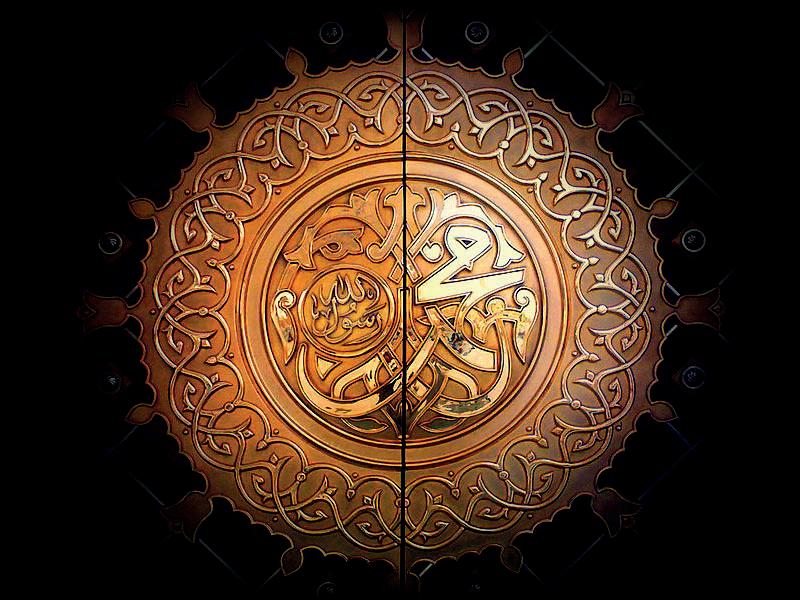
A look at the Bible may help us understand the meaning of sealing, as the notion of “sealing” people is shared by the other Abrahamic faiths. This has implications for understanding the sealing of hearts in the Quran. The Bible uses related language to show that God has marked specific groups of people to separate them from others. The Book of Revelations (Rev 13:16) mentions that in the end days, the evil principalities will force people to have the mark of the beast placed on their foreheads and right arms. The Bible also says that God marks the good people to dissociate them from the bad. The prophet Ezekiel mentions the marks on the foreheads of those who cried against abominations. (Ezekiel 9:4)
The Song of Songs 8:6 describes Israel as a “seal” on the heart and arm of God. The Torah says, “This observance will be for you like a sign on your hand and a reminder on your forehead that this law of the Lord is to be on your lips. For the Lord brought you out of Egypt with his mighty hand.” (Exodus 13:9) Jewish men don tefillin (phylacteries) in prayer based on this commandment, which they understand literally. But interestingly enough, the Karaites, a Jewish sect that rejects rabbinical traditions outside the Bible, interpret the verse metaphorically
9 AL HAKAM | Friday 18 August 2023
Continued on next page >>
AishaAbdel | Wiki Commons
to signify the need to be cognisant of God. A metaphorical understanding of God sealing people has a clear basis in Biblical and Quranic understanding.
Rubin claims he is being consistent in understanding the seal of 33:41 to indicate closure because he believes the Quran conveys this everywhere else. The premise of the argument is problematic, but it may appear true to novices of Arabic. A student with an elementary knowledge of Arabic would know Rubin’s assertion is based on faulty logic. When learning the Quran, we are often able to figure out the meaning of a word based on its relationship to other words that have the same trilateral root. Surah alMaidah says the Jews “kindled (awqadu) the fire of war” (5:65.) The verb awqadu is from the tri-lateral root dha-qa-wa. The same tri-lateral root forms the noun “waqadu” (fuel) in Surah Aal-e-‘Imran, 3:11. Fuel and kindling are related in meaning, although one is a verb and the other is a noun. This will suffice, though, to demonstrate why someone may come to the conclusion that we can understand a word in the Quran by simply looking at the way the same trilateral root is used in other passages.
It is a mistaken assumption that two words sharing the same trilateral root must have similar meanings. The fact that we could see the relationship between words based on trilateral roots does not imply there is a meaningful relationship in all cases. The noun basharan is based on the tri-lateral root ba-sha-ra and means man. Bushra, another noun from the same root, means glad tidings. To give one more example, people understand “jinn” to mean the unperceived beings that sometimes haunt mankind. However, the same trilateral root (j-n-n) also gives us ajinnatun, which means foetuses (Surah an-Najm, 53:33). The tri-lateral root h-j-r will give us the noun stone (hijar) but as an adjective, it could mean hijrun, forbidden (Surah al-An‘am, 6:14). In these examples, we see that tri-lateral relationships based on roots do not always necessitate relationships based on meaning. Likewise, we cannot assume that the “seal” of 33:41 has the same meaning as its verbal forms elsewhere simply because it has the same root. The examples show we cannot even assume two nouns from the same trilateral root have the same meaning, so how could we entertain Rubin’s claim that the seal in 33:41, a noun, has the same meaning as the five verbal forms of khatam elsewhere in the Quran? Rubin produced the first academic translation of the Quran into Hebrew, so he should have known enough about the Arabic language to not make this mistake.
(The Quran: Hebrew Translation from the Arabic with Annotations, New Edition, www. academia.edu/45674001/_THE_QUR_AN_ HEBREW_TRANSLATION_FROM_THE_ ARABIC_WITH_ANNOTATIONS_NEW_ EDITION)
Rubin tried to interpret the meaning of “seal” in 33:41 based on the verbal forms of the trilateral roots used in other places of the Quran. We showed that this strategy is faulty. If, for example, we tried to translate ajinnatun (53:33), a word that occurs only once in the Quran, based on the many times “jinn” is used, we would mistakenly believe that we were once jinn in our mother’s wombs! It is not enough to interpret the Quran by looking at other trilateral roots
in the Quran. That is why it is important to learn the Arabic language that the Quran is based on.
Rubin’s claim that “all occurrences” of the verb khatama imply closure is not his own but one that he acknowledges is based on someone else’s research. Rubin cites Arne A Ambros’ A Concise Dictionary of Koranic Arabic in the footnote for that statement (Ibid., 74, footnote 25). The dictionary seems to be a recognised work, but it is not without critique. Marianne Bjelland Kartzow, a professor of New Testament Studies at the University of Oslo, pointed out that apart from a few cases, the dictionary uses a translation strategy based on the root meaning of a word as opposed to a strategy that is a “co-textually based poly-semantic translation” (The Ambiguous Figure of the Neighbor in Jewish, Christian, and Islamic Texts and Receptions, edited by Marianne Bjelland Kartzow). This strategy is problematic because the Arabic language is polysemantic in nature. Scholars understand meanings by examining the morphology of words as well as semantically related vocabulary. A semantic domain encompasses a range of meanings. For example, the word “run” could mean to move fast, or to operate a computer. The lack of details for semantic domains in Ambros’ work is shared by other critics as well. Hämeen-Anttila, a professor of Arabic language and Islamic Studies at the University of Edinburgh, notes the limitations of Ambros’ work because of the latter’s focus on the meaning of words as opposed to their etymology. Hämeen-Anttila notes the major differences between a standard lexicon of classical Hebrew, which has 4,000 items (Hämeen-Anttila, p. 438). Ambros only has 50 listed in the bibliography. (HämeenAnttila, Jaakko, Wiener Zeitschrift Für Die Kunde Des Morgenlandes 96 (2006): 438–44, www.jstor.org/stable/23862654) Brandon Colas, an intelligence analyst with the UK Defence Intelligence, found Ambros’ dictionary “less helpful” for the same reasons. (Understanding the Idea: Dynamic Equivalence and the Accurate Translation of Jihadist Concepts, Brandon Colas; Studies in Conflict & Terrorism, Volume 42, 2019Issue 9, footnote 12)
Quranic Arabic is rich in meaning, so a student of the Quran would need sources to guide him or her. These sources must help one understand the polysemantic nature of the Arabic language. Why would Rubin pick a book as limited in detail as Ambros’ dictionary, when there are better materials? Why did Rubin not turn to the classical dictionaries to understand the meaning of “seal” in 33:41? He could have cited Lisan alArab, Lane’s Lexicon, and Mufradat. These works demonstrate the various possibilities of meaning available.
We can add that if Rubin truly wanted to be consistent, he would note that “all occurrences” of the verb khatama are metaphorical in nature. Thus, following Rubin’s own logic, we can derive that the noun “seal” i.e., “khatam” in 33:41 is also metaphorical. After all, it would not make any sense to say the Prophet Muhammadsa was a literal “seal.” He was a human being. The question we must ask is: How could we understand the metaphorical “Seal of the Prophets” in a way that is consistent with the general as well as the immediate context of the term in the Quran?
The other dictionary cited by Rubin (Rubin, p. 74, footnote 27), the Foreign Vocabulary of the Quran by A. Jeffrey, is done so in a selective manner. In “foreign vocabulary” under the section with “seal”, Jeffrey quotes the scholar Hartwig Hirshfield, who noted the world seal was of Jewish origin. Hirshfield said the term derives from Haggai 2:23. The word “seal” is used to indicate Zerubablel’s spiritual attainment. (The Foreign Vocabulary of the Qur’an, A Jeffrey, Part 8, p. 121 www.answering-islam. org/Books/Jeffery/Vocabulary/part8.htm ) Hirshfield’s discussion (in Jeffery’s work) is on the same page as the footnote (Jefferys, p. 121) Rubin uses. The discussion here contradicts Rubin’s own understanding of “seal”. Why does Rubin not mention these findings in his own paper? Perhaps Rubin disagrees that we can understand the “Seal of the Prophets” as having a Judeo-Christian basis. However, Rubin does not bother to even cite this contrary information. Is he trying to hide the research from us?
The second set of arguments Rubin makes is based on the pre-Islamic meaning of “seal.” Rubin argues that because there is evidence that “seal” is understood to imply finality in pre-Islamic texts, it must do so in Quran 33:41. It is to be noted that Rubin does not deny the rich meaning of khatam. He specifically mentioned Guy Stroumsa’s article as an example in which the seal metaphor in different texts refers to “confirmation or attestation, not of finality” (Rubin, p. 90). Rubin even admitted that the reliance on pre-Islamic sources is “absolutely justified” (Ibid.) because khatam is used to mean confirmation in multiple Semitic languages. Rubin argues that the ideas of “confirmation and finality are closely intertwined.” (Ibid., 91) For Rubin, the “Seal of the Prophets” implies both confirmation as well as finality.
What does Rubin mean when he claims “confirmation” and “finality” are “closely intertwined” in the “seal” metaphor? Does every use of “seal” denote confirmation and finality? There is no reason to think a seal must denote finality in every instance. The meaning of the word must depend on the context. Scholars of Semitic languages have long pointed out that “khatam” came to mean “finish” or end” in their use prior to Islam. (Marjo Korpel, ‘μt;wjø / tm,t,jo – seal, signet ring’, www.otw-site.eu/KLY/kly.php, p. 9). The fact that the notion of the word seal implying finality can be found in some examples prior to Islam would not prove that “seal” denotes finality in all cases, as we know from understanding the etymology of the word.
Rubin uses A. Jeffreys’ The Quran as Scripture to claim that the seal metaphor already implied finality prior to Islam. (Rubin, p. 90, footnote 96) Therein, Jeffrey says that “seal” denotes “obsignatio, finis, & conclusio.” (The Quran as Scripture, Part IV, Arthur Jeffery, www.answering-islam. org/Books/Jeffery/Scripture/part4.htm) In The Quran as Scripture, Jeffreys argued that “Seal of the Prophets” is understood to imply finality. He uses the Christian New Testament (Hebrews 1:1) as well as writings on the Prophet Mani of the Manichean faith, specifically Mani’s title as the “seal of the prophets.” The interpretation of Hebrews 1:1 would have to be reconciled with other passages (Matthew 23:34, etc.). Both Jeffreys and Strouma (Strouma, 69) noted that the
title “seal of the prophets” attributed to Mani came from Arabic historians and not the writings of Manichean followers themselves. Thus, these examples are not helpful for Rubin’s claim.
Aside from Islamic texts, Rubin also tried to use pre-Islamic scholars to claim “seal” was understood to imply finality. He finds a writing from Tertullian; “There is now, neither vision nor prophet announcing the Christ as going to come.” (Rubin, p. 91) The Church Father went on to challenge the Jews to produce a prophet or miracle like the ones seen in the times of the Old Testament, but everything ended in Christ accordingly. Rubin wants us to understand that, according to Tertullian, there is no more prophecy or miracles because everything has concluded in the person of Jesus Christ.
Rubin’s understanding of Tertullian’s theology is not correct, though. It is well known that Tertullian believed in miraculous gifts of the spirit. Tertullian used the existence of the Montanist sects to prove to his contemporaries that prophecy still occurred, and he wrote in defence of them. The citation from Rubin was a polemic against the Jews, who denied that Jesusas was the Messiah. In other words, Tertullian was not arguing that prophecy ceased in absolute terms but that the revelatory gifts given to Israel were all fulfilled in Christ. (Heresy or Prophecy: Tertullian’s Theology of the Holy Spirit in Early Christianity, Simone K. Degbe (2014) Open Science Repository Religion and Theology, Online (open-access), https://s3.amazonaws.com/ opensciencerepository/Papers/45011812/ Open-Science-Repository-45011812.pdf)
It may be of interest to see how Rubin handles the ahadith that seemingly contradict the notion of Prophetic cessation. Rubin takes on the Holy Prophet’ssa statement on the death of his son Ibrahimas. The hadith “By God, if Ibrahim lived, he would be a prophet” (Ibn Majah) is understood by Friedman to demonstrate that the notion of prophetic “finality” is a late development in Islamic history. “I beg to differ” (Rubin, p. 77), he tries to connect the Holy Prophet’ssa words at Ibrahim’sas demise to an event prior to his son’s birth. There are different versions of the event, in which suspicion is raised against Maryra the Copt. An account is related in which the Prophet Muhammadsa heard that the servant Ma’boor was inside the home of Maryra. In that account, the Prophetsa tells Alira to take his sword and kill Ma’boor. Subsequently, Alira learns that Ma’boor is an eunuch, and the suspicion is obviously unfounded. Other accounts are related in which the angel Gabriel appears to the Holy Prophetsa and confirms the legitimacy of Ibrahim’sra birth. Rubin notes that the different accounts “share a common object, namely, to restore the dignity and purity of Muhammad’s family.” And that Ibrahim’sas description as a prophet “is based on the perception that prophecy is hereditary.” (Rubin, p. 79)
Rubin chooses the most sensational version of the narrative on Ibrahim’sas paternity to change the obvious meaning of the Prophet’ssa hadith. According to Rubin, Prophet Muhammadsa called Ibrahimas a prophet because this proved the child’s legitimacy. This account of Mary’sra suspicion is from al-Waqidi. (Women
Friday 18 August 2023 | AL HAKAM 10
on next page >> << Continued from previous page
Continued
‘Prince of the Faithful received at Town Hall’
Hazrat Musleh-e-Maud in Hamburg, Germany, 1955
Ata-ul-Haye Nasir
Al Hakam
During his visit to Germany, Hazrat Musleh-e-Maudra attended a reception at the Hamburg Town Hall on 27 June 1955, which was organised by the local government in Hamburg.
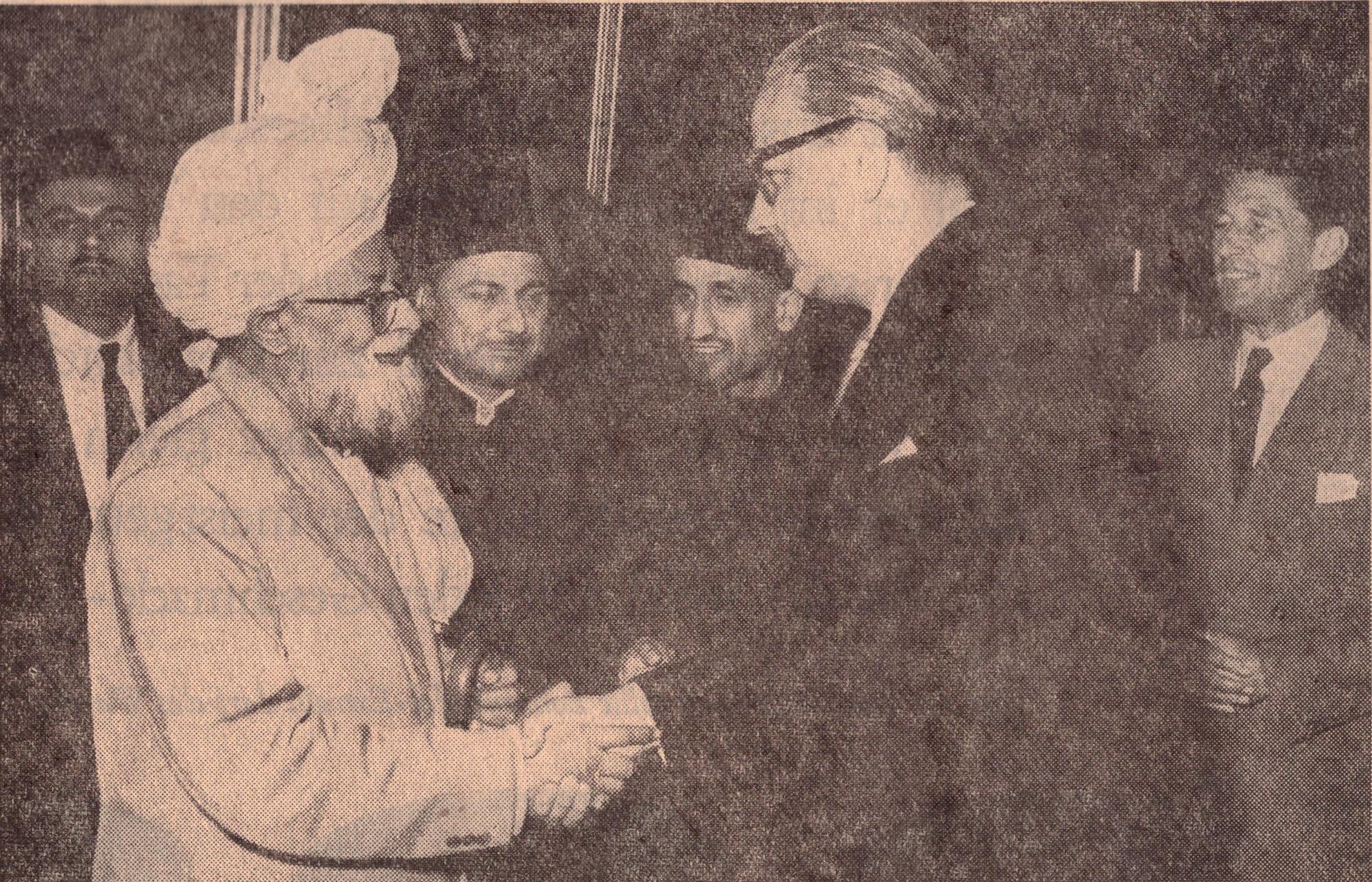
Hazrat Musleh-e-Maudra reached the town hall at 10:45 am local time and granted audience to various officials of the Hamburg government, including a Senator, Mr Joseph Johann August Maria von Fisenne. The meeting continued for around 20 minutes. Various press correspondents were present there as well.
On the same evening, the local jamaat organised a tea party in honour of Huzoorra, which was attended by various local dignitaries and press representatives as well. After an address by the local jamaat, Huzoorra delivered a speech in English for around 30 minutes.
“‘Prince of the Faithful’ received at Town Hall
<< Continued from previous page
During his speech, Huzoorra narrated the details of the newly-established Markaz of Ahmadiyyat, Rabwah, and narrated how Allah the Almighty enabled the Jamaat to establish an astonishing town on barren land, which comprised only three tents at the outset. In the beginning, there was very little drinkable water, and when the water samples were sent to Lahore for assessment, the doctors declared it to be harmful to humans. At that time, Huzoorra stated, Allah the Almighty told him through a revelation that drinkable water would surely be available there, and now, in accordance with the promise of Allah, there is enough around the Messenger”, Muhammad Ali Qutb, International Islamic Publishing House, p. 130 https://ia802806.us.archive. org/1/items/women-around-the-messenger/ Women%20Around%20the%20Messengerpbuh.pdf)
For a concise discussion on Waqidi’s unreliability, refer to The Life and Character of The Seal of Prophets, Vol. 1, pp. 43-48.
Dr Yasir Qadhi, a Sunni theologian, argues, however, that classical Islamic scholarship finds the more reliable version of events in Sahih Muslim. (Seerah of Prophet Muhammad 97 - Maria the Copt & Death of Ibrahim, Dr Yasir Qadhi | 19th Nov 2014 www.youtube.com/watch?v=lvBgwrlUC0; transcript https://arqadhi.blogspot. com/2015/11/097-maria-copt-deathof-ibrahim.html) Dr Qadhi relates that when there was initial suspicion, the Holy Prophetsa asked Alira to take his sword and meet Ma’boor. Dr Qadhi explains that according to Ibn Qayyim, the Holy Prophetsa was asking Alira to investigate the rumours,
drinkable water. Huzoorra said that it was a great sign of the existence of Allah and the truthfulness of Ahmadiyyat.
Further, Huzoorra said that the German nation held a dignified character and that they had rebuilt the city of Hamburg in a short period of time. The German nation, with its lively spirit, would rapidly accept Islam, which itself encourages the same spirit.
Huzoorra said that he is a follower of that prophet, the Holy Prophet Muhammadsa, who made great efforts to establish peace and harmony across the globe and, being triumphant, showed remarkable forgiveness towards his enemies, who had left no stone unturned in their opposition after
not to kill Ma’boor. The account of the Holy Prophetsa asking Alira to kill Ma’boor is suspicious since it falls out of Prophet Muhammad’ssa character.
In any case, the significance of that story is too minimal to warrant a connection to the Holy Prophet’ssa words on Ibrahim’sas demise. If al-Waqidi’s version of events is true, then why are they not reflected in the Quran? This is a legitimate question for Rubin because he spends much space relating 33:40 to the account of Zayd’sra broken marriage. Ten verses in Surah anNur (11-20) were revealed in response to accusations against Lady Ayeshara. If we are to believe Rubin’s account of angels confirming Ibrahim’sas lineage, an account deemed weak (Ali Qutb, p. 130, footnote 44), then wouldn’t we expect the Quran to also clear Ibrahim’sas legitimacy? The fact that the Quran knows no such story means that Rubin’s attempt at “contextualising” the Hadith is not substantial. Even if Rubin’s theory is correct, then what do we do with the Hadith that indicates Ibrahimas would have become a prophet? Rubin would have
they put the Muslims to the sword. Islam, Huzoorra continued, professes a great teaching of harmony that is not found in any other religion. Islam is above all kinds of discrimination, whether it is on the basis of nationality, colour, or race, and presents golden principles to establish worldwide harmony and brotherhood. (Al Fazl, 15 July 1955, p. 3)
Chaudhry Abdul Latif Sahib, the then missionary in Germany, presented the German translation of Huzoor’sra speech.
A local newspaper, Hamburger Anzeiger, published a detailed report of this event, along with a photo of Hazrat Musleh-eMaudra:
[Translation]
us believe the Prophet Muhammadsa only claimed his son was a prophet to prove his heritage, not that Ibrahim was really a prophet. Rubin accuses the Holy Prophetsa of deception. No sincere believer can believe that their prophet would intentionally make such a knowingly false claim. Rubin’s understanding of the Hadith depends on speculation and the alleged dishonesty of the Prophetsa
An epistle of Walid II, an Umayyad Caliph, is cited to prove that prophetic cessation had an early origin. (Rubin, p. 88) The words God “sealed up through his prophetic revelation” (wa-khatama bihi wahyahu) (Rubin, p. 88) are up for interpretation, but what is important for us is what we can learn about the word seal in various languages based on its religious significance and not a political one by the latter rulers.
We could see Rubin’s hypocrisy in his discussion of sayings attributed to Ayeshara and Umayya ibn Salt. On Ayesha’sra hadith (“Say, he is the seal of the prophets, but not that there is no prophet after him” [Al-Dur
“The head of the Islamic Ahmadiyya Movement, Caliph Hazrat Mirza Mahmud Ahmad (left), was received by Senator von Fisenne (right) at the Town Hall yesterday. The 66-year-old ‘Prince of the Faithful’, revered as the ‘Promising Reformer’, described at a reception in the Europäischer Hof how the current headquarters of the movement ‘Rabwah’ in Pakistan was founded in 1950 [sic, 1948]. From a village in the middle of a desert, it has developed into a large city with secondary schools and a seminary for Muslims. Islam is the religion of peace and brotherhood and therefore also the right one for Europe and for Germany, Hazrat Mirza explained. As a true international religion, it is now trying to find its way into Germany and win believers for Islam. The spirit of Islam is also alive in Germany, the Prince explained. The Ahmadiyya Movement, whose headquarters in the Federal Republic is in Hamburg, maintains missions in all countries.” (Hamburger Anzeiger, 28 June 1955, p. 4)
Joseph Johann August Maria von Fisenne (1902-1987) was a German pharmacist and politician. He initially worked as a pharmacist in Küstrin, Berlin, and Hamburg for a few years. After World War II, he joined the CDU (Christlich Demokratische Union Deutschlands). In the Senat Sieveking (Senate of the Free and Hanseatic City of Hamburg), von Fisenne served as the Senator of the Building Authority from December 1954 to December 1955 and as the Senator of the Police Authority from January to March 1956.
al-Manthur]), Rubin writes that it could only be understood according to Ibn Mughira. The latter opined that this was in reference to the second coming of Jesus. Rubin then mentions Ummaya b. Salt’s line of poetry; “With him, God has sealed up any prophet that was before him. As well as any prophet after him.” (Friedman, p. 184) Rubin argues that it “seems” the words “only repeat” (Rubin, p. 95) the belief in the second coming of Jesus. But why does Rubin think these two statements relate to a “second coming belief? Nowhere in the Quran does it state that Jesusas will return. The “second coming” is referenced in the hadith and is arguably misunderstood in secondary sources by the time Christian theological speculations entered Islamic thought. We would expect a scholar like Rubin to know this. So why is Rubin using “extra-Quranic material” to understand the Quran here when he already stated his methodology and expunged it? Would not Rubin be more consistent with himself if he tried to interpret the Ayeshara hadith and Ibn Salt’s poetry according to the Quran alone?
11 AL HAKAM | Friday 18 August 2023
Joseph Johann August Maria von Fisenne meeting with Hazrat Musleh-e-Maudra | Hamburger Anzeiger, 28 June 1955
100 Years Ago...
Increase in new converts in America and an update from Hazrat Mufti Muhammad Sadiq

Al Fazl, 13 July & 17 August 1923
Hazrat Maulvi Muhammad Dinra (1881-1983)
New converts
According to the report of the week under discussion, eight new converts joined the Ahmadiyya Jamaat, alhamdulillah. These new converts include four white Americans, a native of China, and an African.
Lectures and interesting questions and answers
This week, both sessions of our Sunday jalsa [gathering] were very successful. In the morning session, there were around 70 people, some of whom were newcomer orthodox Christians. Among them was a Christian sermoniser as well, who had come all the way from the West Indies. She was presented with the message of Islam in person.
There were also a lot of people in the second session of the gathering. After Hazrat Mufti Sahib’s lecture, a very interesting discussion on the Issue of Buruz [Spiritual Projection], Existence of God, and Reincarnation, was held.
An allegation raised by an atheist made this discussion even more interesting. When this argument was presented to him that a person all alone declared that he had come from God and that whoever did not obey him would come to nought. The people of the world stood against him and, by all means, tried to annihilate or even kill him, etc. However, he stood resolute and said that even the greatest of empires would perish and be destroyed if they were to stand up against him. And then, for not one or two years, he continued to deliver this message for 23 years, practically proving that what he said was absolutely true. This truth was firmly established in the world, and he witnessed before his very eyes that all his enemies were humiliated, disgraced, and defeated. And the empires that wanted to lay hands on him fell to pieces. He declared this as proof of the existence of God, and in his formative years, he presented it as proof of his truthfulness. [The atheist was asked], “Is this not an undeniable proof of the existence of God?” Upon this, he was astounded and suddenly enquired as to who this person was. He was informed that there were many such chosen ones of God, but the greatest of them all was the Holy Prophet Muhammad al-Mustafa, peace and blessings of Allah be upon him, and all this was presented as proof by him. He replied, “I cannot believe this.” He was told that it is only in the hands
of God to guide a disbeliever, but he could not refute this argument because nobody can deny the factual events.
Interest in learning the teachings of Islam
Many people who come to take Arabic lessons are expressing their desire to convert to Islam. These people are not able to spare time during the day due to their businesses, work and labour. Some friends are not only memorising different parts of the Holy Quran but are also trying their best to learn its correct pronunciation. Hence, they regularly come here two to three times a week and recite [the Holy Quran] by repeating it after me.
For the information of merchants
Many friends enquire of us about certain matters of trade and the names of the merchants here. By spending effort, time, and money on our part, they are provided with the necessary information. However, it does not mean that we are responsible in any way. It is their responsibility to start the business to their own satisfaction and take absolute care by utilising all available means. In other words, as much as they take care and caution in other worldly businesses, they should do the same in this case as well. Moreover, one should also be mindful that some people send items to sell here. First of all, these friends should pay attention to the fact that heavy import duties have to be paid here. And sometimes we don’t even have the expenses to cover our food costs. On the other hand, those items are sometimes such that there is no demand for them here. So, they should first send a sample and enquire with us. Furthermore, keeping in mind our financial condition, please try your best not to burden us. For example, it costs us about two dollars to send a simple prospectus. That is, six to seven rupees are spent on this trivial matter. We do not and should not have any excuses for serving our friends, but considering the conditions here and taking the duty of preaching into account, these few lines had to be written. We never refuse to help and never will, insha-Allah
New converts observed fasts
Some of the new converts here devotedly kept all the fasts of Ramadan last month, even though they were not used to it. Rather, under the conditions here, they were used to eating four times a day. They are so fond of food that it is very difficult for them to resist the temptation, but still, with great
sincerity and enthusiasm, they observed all the fasts. May Allah the Almighty grant them the best of rewards and bless them with the ability to progress further in goodness.
Likewise, some other new converts who live on the West coast of America, several thousand miles away from us, have also sent letters saying that they have also kept all the fasts of Ramadan. Moreover, they expressed that their fasts did not have any effect on their work. Here, labourers have to work very hard. Although there was no holiday here on the day of Eid, several people left their businesses, gathered in large numbers, and offered Eid prayer in congregation.
By the grace of God Almighty, the work of preaching Islam is being done very well. New converts seek to learn and practise religion. Many righteous people and seekers of truth are engaged in research on Islam. May Allah the Almighty grant them the strength to accept Islam soon.
Al Fazl, 17 August 1923
Although the following report is short, the readers can observe how every word of it manifests great success, which is the result of the blessings and mercy of Allah the Almighty. May God grant Mufti Sahib the best of rewards, and may the seed of Ahmadiyyat that has been planted in America through him continue to grow by the day. —Editor, Al Fazl
Hazrat Mufti Muhammad Sadiqra (1872-1957)
Alhamdulillah, the work of preaching that I had started in this country [of America] was accomplished only by the grace, mercy, and generosity of Allah the Almighty. A mosque has been built here, a mission house has been established, and a sincere Jamaat has been formed.
Maulvi Muhammad Din Sahib has understood and taken over all the work in the last three months. May Allah the Almighty help him and bless him with the strength to do more work. Brothers Muhammad Yusuf Khan Sahib and Syed Abdul Rahman Sahib are also staying with Maulvi Muhammad Din Sahib and helping him in his work. I have handed over the charge of all the work to Maulvi Muhammad Din Sahib and its copy has been sent to the office of Nazir in Qadian. The council here [in America] has also been forwarded a request to register the
Ahmadiyya Jamaat with the government. Once the Jamaat is registered, the mosque and mission house will not be taxed by the government.
After handing over the charge, I am only staying here waiting for the travel expenses from Qadian.
We are receiving requests for lectures from other cities. I found it apt to spend the waiting time delivering the lectures. Hence, I moved from Chicago to Ashland, Kentucky. The population of this city is only around 10,000, but the streets are wide and clean, the market is extensive, and the houses are splendid. The city stretches for several miles along the river. Moreover, the mountains and the landscape are captivating, the people are creative, and the city has electricity, gas for cooking, underground drains in the toilets and bathrooms, a good library, several bunk beds, and all the essentials for comfort. Here, a sermon was to be held in a church, but it could not be delivered due to the opposition of the priests. Consequently, a lecture was given in a house. It had a great impact on the audience. Afterwards, literature was distributed, and the message of Islam was verbally conveyed to the participants. A lady converted to Islam, and several people came closer who are now studying the literature.
We have to visit another city from here, but I have to leave soon. Our mailing address is the same, and friends should keep sending all the letters, etc., to Chicago. Until the telegram about my departure is received from Qadian, friends should continue to send their letters here and bless me with their half mulaqat [meeting through letters].
My brother, Maulvi Muhammad Din Sahib, is sending reports about the work going on in Chicago. Therefore, I did not feel the need to write anything about it. Wassalam, Muhammad Sadiq, 9 July 1923.
(Translated and edited by Al Hakam from the original Urdu, published in the 13 July and 17 August 1923 issues of Al Fazl)
Friday 18 August 2023 | AL HAKAM 12
Samuel Branch | Unsplash
Friday Sermon
Baitul Futuh Mosque, Morden, UK
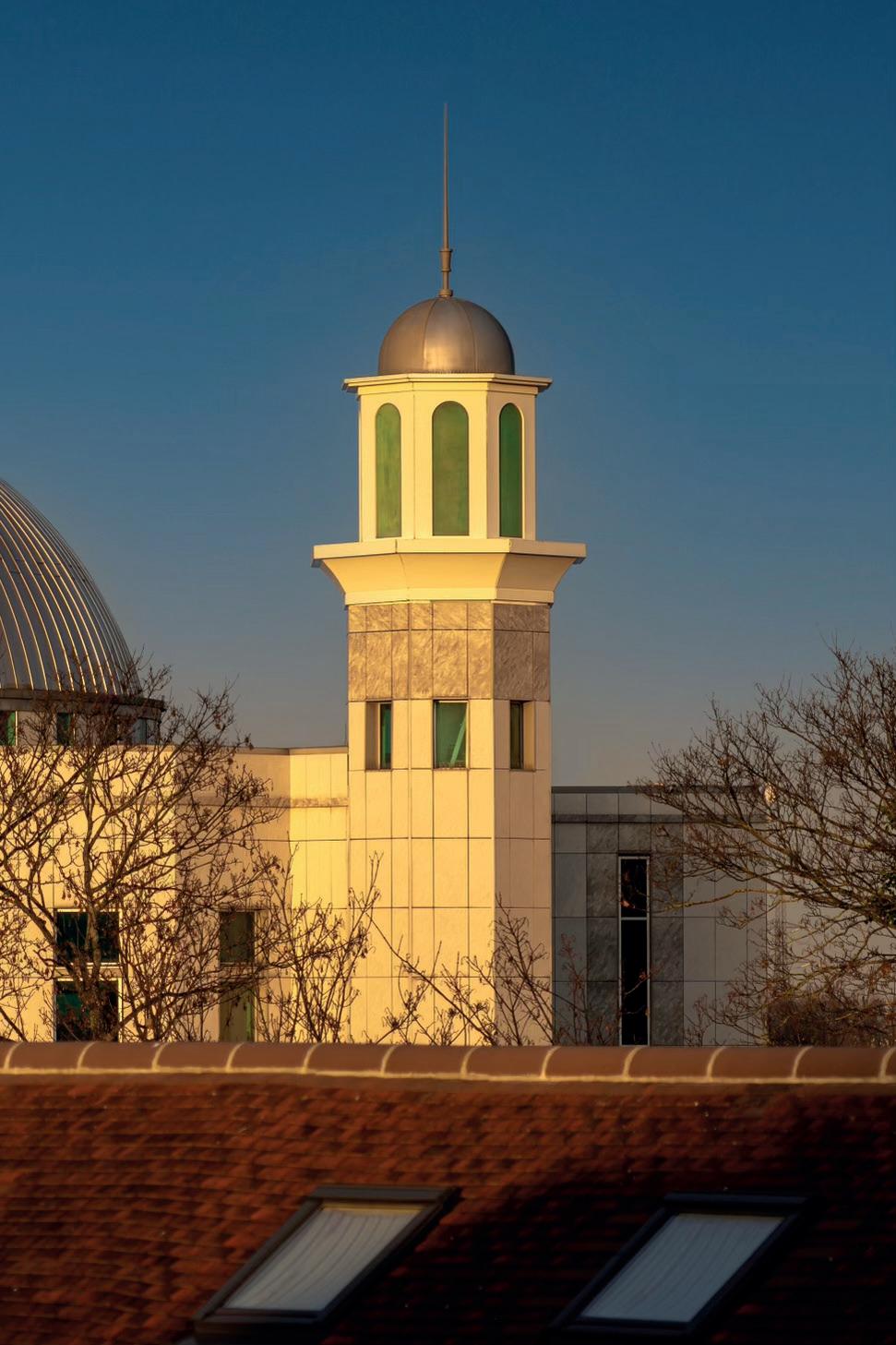
21 July 2023
Muhammadsa: The great exemplar
After reciting the tashahhud, ta‘awwuz and Surah al-Fatihah, Hazrat Khalifatul Masih Vaa stated:
The accounts from the life of the Holy Prophetsa are being mentioned with reference to the Battle of Badr. I will present some more details in relation to this. With regards to the Holy Prophet’ssa kind treatment of the prisoners, once the Battle of Badr had concluded, it is written in Tabaqat Ibn Sa’d that when the prisoners of Badr arrived, the paternal uncle of the Holy Prophetsa, Hazrat Abbasra, was also among them. As such, the Holy Prophetsa did not sleep the entire night. One of his companions asked the Holy Prophetsa: “O Messengersa of Allah! What has kept you awake?” Upon this, the Holy Prophetsa replied: “The sound of agony from Abbas.” Subsequently, someone went and loosened the shackles of Hazrat Abbasra. He was tied up and he slightly loosened the chains. Upon this, the Holy Prophetsa said: “What has happened? I can no longer hear the sound of Abbas in agony.” Upon this, the individual replied: “I slightly loosened his shackles.” Upon this, the Holy Prophetsa said: “Then you should do the same for all prisoners.” (Ibn Sa’d, Tabaqat al-Kubra, Vol. 4, p. 9, Dar al-Kutub al-Ilmiyyah, Beirut, Lebanon 2012)
The shackles of only one person should not be loosened on account of his relationship to the Holy Prophetsa
In relation to the prisoners of the Battle of Badr, Hazrat Mirza Bashir Ahmadra has presented the details in The Life and Character of the Seal of Prophetssa:
“The Holy Prophetsa remained in the valley of Badr for three days. This time was spent shrouding and burying the martyrs and nursing the wounded. Similarly, it was during these days that the spoils were collected and sorted. The prisoners of the disbelievers, which equated to seventy, were secured and given into the custody of various Muslims. The Holy Prophetsa
strictly directed the Muslims to treat the prisoners gently and kindly; and to ensure that their comforts were looked after. The Companions, who possessed a passionate love of fulfilling their Master’s every desire, acted upon this admonition so wonderfully that the like of it cannot be found in the history of the world. Hence, from among these prisoners, one prisoner named Abu ‘Aziz bin ‘Umair relates that:
“‘Due to the exhortation of the Holy Prophetsa, the Ansar would give me baked bread, but they themselves, would subsist on dates, etc. Many a time, it would so happen that even if they managed to procure a small piece of bread, they would give it to me, and would not eat it themselves. If I would ever return it to them in embarrassment, they would insist that I have it.’
“Those prisoners who did not have sufficient clothing were given clothing. As such, ‘Abdullah bin Ubayy gave Abbas his shirt.
“Sir William Muir admits to the kind treatment of these prisoners in the following words:
“‘In pursuance of Mahomet’s[sa] commands, the citizens of Medina, and such of the Refugees as already had houses of their own, received the prisoners, and treat them with much consideration. “Blessings be on the men of Medina!” said one of these prisoners in later days: “they made us ride, while they themselves walked: they gave us wheaten bread to eat when there was little of it, contenting themselves with dates.”’”
“Sir William Muir adds:
“‘It is not surprising that when, some time afterwards, their friends came to ransom them, several of the prisoners who had been thus received, declared themselves adherents of Islam (the result of the prisoners being treated in this manner was that some of them became Muslim) [...]
13 AL HAKAM | Friday 18 August 2023
Photo courtesy of Suhaib Ahmad
Their kindly treatment was thus prolonged, and left a favourable impression on the minds even of those who did not at once go over to Islam.’” (The Life & Character of the Seal of Prophetssa, Vol. 2 pp. 157-158)
In relation to the significance and the impact of the Battle of Badr, it is mentioned that ‘Abdullah bin Rawahara and Zaid bin Harithahra brought the glad tidings of victory in the Battle of Badr to Medina. Upon hearing this announcement, the enemy of Allah, Ka’b bin Ashraf, started accusing them of lies. He said: “If Muhammad[sa] has killed these prominent leaders then it would be better to live inside the earth, rather than on it.” That is to say, it would be better to die than to remain alive.
(Al-Sirah al-Halabiyyah, Vol. 2, p. 250, Dar al-Kutub al-Ilmiyyah, Beirut, 2002)
Stating the outcome of the Battle of Badr, ‘Allama Shibli Nomani writes in his book, “The Battle of Badr had a diverse impact on the religious and social circumstances [of the land]. This was, in fact, the first step in the advancement of Islam. All prominent leaders of the Quraish, who were like iron walls in the way of Islam, perished.
Following the death of ‘Utbah and Abu Jahl, Abu Sufyan was handed the leadership of the Quraish and this commenced the Umayyad dynasty. However, the real strength and might of the Quraish had already diminished. In Medina, ‘Abdullah bin Ubayy bin Sulool was still openly declaring himself to be a disbeliever, but now seemed to have come towards the fold of Islam (following the victory of Badr, he accepted Islam superficially), although he remained a hypocrite for his entire life and died in this very state. The rest of the Arab tribes, who were witnessing these events, although were not won over, but nonetheless receded (many tribes, although they did not convert to Islam, certainly backed down after witnessing the victory [of Badr]. They stopped scheming against the Muslims, or became afraid). In addition to this change in situation, new developments emerged amongst the opposition. A pact had already been made with the Jews that they would stand with them [the Muslims] in all circumstances. However, this victory kindled a fire of jealousy within them and they were unable to suppress it […] Previously, the Quraish only lamented over Hazrami, but following the Battle of Badr, every household was a mourning place and every child in Mecca was desperate to avenge the death of those who were killed in the Battle of Badr. Hence, the incident of Suwaiq and the Battle of Uhud were a result of this zeal of theirs.” (Shibli Nomani, Sirat al-Nabiyy, Vol. 1, pp. 210-211, RZ Packages, Lahore 1408 AH)
Mentioning the outcome of the Battle of Badr, Hazrat Mirza Bashir Ahmadra has written the following:
“Until now, many people from the tribes of Aus and Khazraj still stood firm upon polytheism. The victory of Badr resulted in a movement among these people and upon witnessing this magnificent and extraordinary victory, many people from among them became convinced of the truth of Islam. Thereafter, the element of idol worship began to diminish very rapidly in Medina. However, there were also some in whose hearts this victory of Islam had sparked a fire of rancour and jealousy. Finding it unwise to oppose
openly, outwardly they accepted Islam, but from the inside, they sought to uproot it and joined the party of the hypocrites. The most prominent among the latter class of people was ‘Abdullah bin Ubayy bin Sulul, who was a very renowned chieftain of the Khazraj tribe. Due to the arrival of the Holy Prophetsa to Medina, he had already suffered the shock of having his leadership taken from him. After Badr, this individual became a Muslim at the outset, but his heart was satiated with malice and enmity towards Islam. He became the leader of hypocrisy and secretly began to hatch a series of conspiracies against Islam and the Holy Prophetsa.” (The Life & Character of the Seal of Prophetssa, Vol. 2, pp. 172-173)
Hazrat Mirza Bashir Ahmadra further states:
“The battle of Badr had a deep and lasting effect on both the disbelievers and the Muslims. It is for this reason that this battle possesses a distinct significance in the history of Islam; to such an extent, that the Holy Quran has named this battle ‘Yaum al-Furqan,’ i.e., the day upon which a manifest distinction was made between Islam and disbelief. There is no doubt that other wars also took place between the Quraish and the Muslims afterwards, and some of them were immensely fierce. At times, the Muslims were confronted with delicate situations, but in the battle of Badr, the spine of the Quraish had been broken, which no surgical operation could permanently repair thereafter. As far as the number of casualties was concerned, this was no great defeat. The death of seventy or seventy-two warriors for a people like the Quraish, can in no way be deemed a national devastation. In the battle of Uhud, this was the number of Muslim casualties. However, this loss did not even prove to be a temporary hindrance in the victorious pathway of the Muslims (even though the Muslims were very weak at the time). Why then was the Battle of Badr dubbed Yaum al-Furqan? In response to this question, the best answer is in the following words of the Holy Quran:
“‘Verily, on that day, the root of the disbelievers was cut off.’
In other words, the blow of the Battle of Badr hit the root of the disbelievers, and it was shattered to pieces. If this very blow had struck the branches instead of the root, irrespective of how great a loss it would have inflicted, this loss would have been nothing compared to the one actually incurred. However, this blow to the root turned this lush green tree to a pile of coal, in a matter of moments. Only those branches survived which attached themselves to the other tree, before drying away. Therefore, in the field of Badr, the loss of the Quraish was not measured by the number of men who died, but rather, by the people who died. When we cast a glance upon the casualties of the Quraish from this perspective, there remains no room for even the slightest doubt or uncertainty, that in Badr, the root of the Quraish was truly cut off. ‘Utbah, Shaibah, Umayyah bin Khalf, Abu Jahl, ‘Uqbah bin Abi Mu‘it and Nadr bin Harith, etc., were the moving spirit of the Quraish. This spirit flew off from the Quraish in the valley of Badr forever, and they were left like lifeless bodies. It is for this reason that
the Battle of Badr has been given the name of Yaum al-Furqan.” (The Life & Character of the Seal of Prophetssa, Vol. 2, pp. 165-166)
In reference to this, Hazrat Musleh-eMaudra states:
“This is the very battle that Allah the Almighty has named ‘Furqan’ in the Holy Quran, and it was during this battle that such Arab chieftains were eliminated who left their homes claiming that they would destroy Islam once and for all. They were eliminated in a manner that today, their names have been forgotten. If their names are recalled at all, affiliation to them is not a means of pride but a means of disgrace. Ultimately, Allah the Almighty granted the Muslims a grand victory through this battle.” (Sirat-un-Nabisa , Anwar-ul-Ulum, Vol. 1, p. 610)
Hazrat Musleh-e-Maudra also states:
“There is no doubt that even after this [battle], the Muslims were subject to cruelty and forced to fight against the disbelievers on various occasions. However, the Battle of Badr unquestionably utterly crushed the strength of the disbelievers and demonstrated before them the might of the Muslims. The Battle of Badr referred to as ‘Furqan’ in the Holy Quran, has also been prophesied in the Bible. In the book of Isaiah, chapter 21 verses 13 to 17, it is recorded: ‘ A prophecy against Arabia: You caravans of Dedanites, who camp in the thickets of Arabia, bring water for the thirsty; you who live in Tema, bring food for the fugitives. They flee from the sword, from the drawn sword, from the bent bow and from the heat of battle. This is what the Lord says to me: “Within one year, as a servant bound by contract would count it, all the splendour of Kedar will come to an end. The survivors of the archers, the warriors of Kedar, will be few.” The Lord, the God of Israel, has spoken.’”
Hazrat Musleh-e-Maudra further states:
“In these words of Prophet Isaiah, it was prophesied that exactly one year after the period of migration, a war would take place in Arabia that would reduce the splendour of Kedar to dust. Those who accuse the Holy Prophet Muhammadsa of fleeing will flee themselves in the presence of their own armies. Their state will be that the corpses of their commanders and generals will be left on the battlefield, and ultimately, the Valley of Mecca will lose its generals, thereby forfeiting the strength it once had. Similarly, the Holy Quran foretold of an eleventh night and prophesied that precisely one year following the migration, the disbeliever’s strength would be broken whilst victory and triumph would dawn upon the Muslims. Thus, after exactly one year, the Battle of Badr took place during which many ranking leaders were killed, and the Muslims attained a resounding victory over them.”
Hazrat Musleh-e-Maudra continues:
“Ponder! Until the first Ramadan after coming to Medina, it had been 10 years since this prophecy was made. The month of Ramadan would begin the eleventh year. After this year elapsed, at the beginning of the eleventh year, on 17 Ramadan, the Battle of Badr took place during which prominent disbelievers were killed, bringing an end to their vicious attacks. The eleventh night that had overcome the Muslims had now passed. Through the favour and help of Allah the Almighty, the Muslims witnessed
the dawn of victory and triumph.” (Tafsir-eKabir, Vol. 8, p. 515)
Regarding the excellence of the Companions who took part in the Battle of Badr, it is recorded that Hazrat Gabriel came to the Holy Prophetsa and said, “Amongst the Muslims, what rank do you give those who partook in the Battle of Badr?” The Holy Prophetsa replied, “They are the best of Muslims,” or a similar statement. Angel Gabriel said, “Similarly, those angels who partook in the Battle of Badr also hold a high rank.” (Sahih al-Bukhari, Kitab alMaghazi, Bab Shuhud al-Mala’ikah Badran, Hadith 3992)
The incident I am about to narrate has already been mentioned in reference to Hazrat Alira, however, I will mention it again due to its significance in this context.
Ubaidullah bin Abi Rafira narrates that he heard Hazrat Alira say:
“The Holy Prophetsa sent Zubairra, Miqdad bin Aswadra and I, and instructed us to go to Roza Khakh. There, we would find a woman riding a camel with a letter that we should confiscate. We departed as our horses galloped swiftly. When we reached Roza Khakh, we found a woman riding a camel there. We asked her to surrender the letter. She said, ‘I do not have any letter.’ We replied, ‘You must surrender the letter to us, otherwise we will remove your clothes and search you.’ Upon this, she took the letter out of her hair and gave it to us. We brought the letter back to the Holy Prophetsa. When the letter was opened, it read, ‘From Hatib bin Abi Balta’ah to the people of Mecca.’ He was informing them about a plan of the Holy Prophetsa. The Holy Prophetsa summoned Hatib and asked, ‘O Hatib, what is this?’ He replied, ‘O Messengersa of Allah, please do not be quick to pass judgment on me. I am a man who settled among the Quraish. I am not native to them. Your other migrant Companions have relatives in Mecca through whom they have secured their homes and wealth. Because I do not have relatives among them, by doing this I wished to win their favour so they would be considerate towards me. I have not committed this act out of disbelief or apostasy, for I could never prefer disbelief after having accepted Islam.’ (He said that he could never be drawn to disbelief after accepting Islam with a true heart). Upon hearing this, the Holy Prophetsa said, ‘He has said the truth to you.’ Hazrat Umarra remarked, ‘O Messengersa of Allah, permit me to smite this hypocrite’s neck.’ The Holy Prophetsa replied, ‘He participated in the Battle of Badr. You do not know, but Allah has witnessed the Companions of Badr and has said, “Do as you please, for I have covered your sins.”’” (Sahih al-Bukhari, Kitabl al-Jihad wa al-Siyar, Bab al-Jasus, Hadith 3007)
In other words, they would no longer commit major sins, and they would meet a good end. This meant that these people would not die in a state of disbelief. Thus, it is evident from the words of Hazrat Hatibra – as I have already stated – that disbelief can never be preferred after accepting Islam.
Hazrat Abu Hurairahra relates that the Holy Prophetsa said, “Perhaps Allah the Almighty has looked upon the Companions of Badr and said, ‘Do as you please, for I have forgiven you.’” (Sunan abi Da’ud, Kitab al-Sunnah, Bab fi al-Khulafa, Hadith 4654)
In other words, apart from disbelief,
Friday 18 August 2023 | AL HAKAM 14
نيرفكلا رباد عطقی
Allah the Almighty will forgive their common and minor mistakes. Through these words, Allah the Almighty also assured them that they would never devolve into disbelief and that their fate would be auspicious. This is also what is meant by these words. Even if some mistakes or sins are committed, they would be as a result of human weakness, which would be forgiven by Allah the Almighty.
Umm-ul-Momineen, Hazrat Hafsahra relates, “The Holy Prophetsa said, ‘I am hopeful that those who participated in Badr and Hudaibiyah will never, God willing, enter the hellfire.’ I submitted, ‘O Messengersa of Allah, has Allah not stated:
“And there is not one of you but will come to it.”’ Upon this, the Holy Prophetsa said, ‘Have you not heard the following words of Allah the Almighty:
“Then We shall save the righteous and We shall leave the wrongdoers therein, on their knees.”’” (Sunan Ibn Majah, Kitab alZuhd, Bad Zikr al-Ba’th, Hadith 4281)
Even during the Caliphate of Hazrat Umarra, when monetary allowances for the Companions were being instated, the allowances for the Companions of Badr were especially distinguished. The Companions of Badr themselves would take pride in their participation in the battle. [Sir William] Muir writes:
“These were the peerage of Islam. ‘Bring me here the garment in which I went forth to Bedr; for this end have I kept it laid up unto this day.’ So spake Sa‘d, the youthful convert of Mecca, now about to die at fourscore years of age. Crowned with renown as the conqueror of Persia, the founder of Cufa, and the Viceroy of Irac, his honours were all cast into the shade by the glory of having shared in the battle of Bedr. In his eyes the ‘garment of Bedr’ was the highest badge of nobility, and in it would he be carried to his grave. ” (The Life & Character of the Seal of Prophetssa, Vol. 2, pp. 168-169)
One can gauge the significance and excellence of the Companions of Badr from the fact that one of the signs of the advent of the Mahdi in this Ummah set out by the Holy Prophetsa was that he would also have a book in which he has names of 313 companions – in accordance with the number of Companions of Badr. Thus, the Promised Messiahas states:
“It has been mentioned in an authentic Hadith that the Promised Mahdi would have a published book in which the names 313 of his companions would be written. As such, it is necessary to mention that this prophecy has been fulfilled today. It is apparent that before now, there was not a single person in this Ummah who claimed to be the Mahdi at whose time there were printing presses or who had a single book in which he could have written the names of 313 people. Of course, if this work was within the scope of human effort, then there could have been many people before this who could have falsely made claims about themselves. However, the reality is that the prophecies of God contain such extraordinary requirements that a liar cannot take advantage of them, and they are not afforded the means which are granted to the truthful.”
The Promised Messiahas further states:
“In his book Jawahir al-Asrar which was published in 840 AH, Sheikh Ali Hamza bin Ali Malik Al-Tusi writes the following about the Promised Mahdi, (the translation of which is) that the Mahdi will hail from a village called Kad’ah.’ (This in fact is the Arabic version of Qadian. He then says,) ‘God will prove the truthfulness of that Mahdi and will gather his friends from far and wide, who will be equal in number to the people of Badr, in other words, they will number 313, and their names, character and qualities will be written in a published book. It is clear that before now no one has claimed to be the Promised Mahdi and also had a published book which would contain the names of his friends. However, I have previously written 313 names in A’ina-eKamalat-e-Islam and to further confirm this I shall write those 313 names here once again. (The Promised Messiahas wrote this in the appendix of the book, Anjame-Atham). Every fair-minded individual should know that this is yet another prophecy that was fulfilled in my favour. In accordance with what has been stated in the narration, it is necessary to state from the outset that all of these companions possess qualities of truthfulness and piety and as far as their ranks, which Allah the Almighty knows best, some excelled others in love and devotion to Allah and being occupied in service to the faith. Observe, these 313 sincere people who are mentioned in this book are a fulfilment of this very prophecy which is found in the traditions of the Holy Prophetsa. The prophecy also contains the words ‘Kad’ah’ which is clearly pointing towards Qadian. The entire purport of this Hadith is that the Promised Mahdi will be born in Qadian, and will have a published book in which the names of 313 of his friends will be written. Everyone knows that it was not possible for me to write the name of my town Qadian in books that were written a thousand years ago. Nor did I create a printing machine on account of which it could be said that I invented the printing press in this era for this very purpose (he did not invent the printing press). It was also beyond my scope to bring about 313 companions. In fact, it was God Almighty who procured these means in order to fulfil the prophecy made by His Messengersa.” (Zamimah Anjam-e-Atham, Ruhani Khazain, Vol. 11, pp. 324-325, 329)
Whilst stating the similarities between the Holy Prophetsa and Prophet Mosesas in relation to the Battle of Badr, the Promised Messiahas states:
“Just like the Israelites, God’s rightly guided people suffered great difficulties for 13 years in Mecca at the hands of the disbelievers. These difficulties were far greater than those inflicted by the Pharaoh upon the Israelites. Eventually, these rightly guided people fled Mecca along with he who was most righteous among them and in his leadership, just like the Israelites did. Then, the people of Mecca chased after them in order to kill them, just like Pharaoh who chased after the Israelites in order to kill them. Ultimately, it was as a result of this pursuit that they met their ruin at Badr, just as Pharaoh and his army met their ruin in the Nile River. It was to uncover this connection that upon seeing the body of Abu Jahl among those who were killed at Badr, the Holy Prophetsa said that this
person is the Pharaoh of this nation. Just as Pharaoh and his army perishing in the Nile River was a matter which was witnessed and experienced and was thus something which no one could object to, so too was the pursuit made by Abu Jahl and his army resulting in defeat at the Battle of Badr a matter which was witnessed and experienced, the denial of which would be foolish and lunacy […] The people bearing resemblance to the Israelites, in other words, those people of God who were freed by our Leader and Master from the cruelties of the Meccans sang hymns after the Battle of Badr just as the Israelites did on the shores of the Nile River. Those Arabic hymns that were sung in the plains of Badr are still preserved in books to this day.” (Ayyam-us-Sulh, Ruhani Khazain, Vol. 14, pp. 290-291)
Then, at another instance, the Promised Messiahas states:
“The example given in the Torah in Deuteronomy is of that very prophet who was accompanied with divine help and along with his community bore hardships and every type of difficulty for 13 years and then eventually fled along with his community, but they were followed. Ultimately, within a few hours in the battle at Badr, Abu Jahl and his people were smitten by swift swords just as Pharaoh and his army perished by the swiftness of the Nile River. Observe the clarity and how from the standpoint of witness and experience both the incidents of Egypt and Mecca bear such stark resemblance.” (Ayyam-us-Sulh, Ruhani Khazain, Vol. 14, pp. 292)
It is stated in the Holy Quran:
“And Allah already helped you at Badr when you were weak.” (3:124)
In his book Khutbah Ilhamiyyah, whilst mentioning a subtle resemblance between Badr [full moon] and the fourteenth century, the Promised Messiahas states, the Urdu translation is as follows:
“The number 400 is after the migration of the Holy Prophetsa, who was the Seal of Prophets so that the victory of Islam which had already been promised in the Holy Quran would come to fruition. In other words, the statement of God:
“Ponder over this verse like those who possess sight, because certainly, this verse points towards two Badrs. First was the Badr which came for the help of the first ones, and the second Badr which was a sign for those to come after. There is no doubt that this verse contains a subtle indication towards that time in the future which was to be like the night of Badr and would manifest 400 years after a period of 1,000 years. This is the metaphor used by God Almighty when He mentions the night of Badr. Further to this, we also accept that this verse has other meanings as well which pertain to previous times, as scholars will be well aware, because this verse has two perspectives; there are two [times of] help and two Badrs. One Badr pertains to previous times, whereas the other Badr pertains to the times yet to come, when the Muslims would be in an extremely lowly state, as you can witness in today’s current times. Islam started like the crescent moon, and it was decreed that ultimately, in the latter days, it would turn into a full moon
[Badr] by the command of Allah. Hence, the wisdom of God Almighty dictated that in this century, Islam should become like the Badr [full moon], which would also be similar to Badr in terms of its numbers. It is these very meanings that God Almighty indicates in the words,
“[And Allah already helped you at Badr]
“Hence, ponder over this matter with careful consideration and do not be like the ignorant. Indeed, the words مكرصن دقل have been used as مكرصنيin light of its other aspects, just as it is apparent to those who possess understanding. Therefore, for the sake of Islam, God Almighty decreed that after having to face a state of weakness twice, Islam should also be honoured twice, in contrast to the Jewish people for whom it was decreed as punishment that after two honours they would face two humiliations, just as you read in the accounts of those transgressors and tyrants in the Chapter Bani Isra’il. At the time when the Muslims had to endure humiliation in Mecca, God made a promise to them in the following words,
““[Permission to fight is given to those against whom war is made, because they have been wronged — and Allah indeed has power to help them. (22:40)]“By saying ‘to help them’, God indicated that the disbelievers would suffer punishment at the hands of the believers. And so, this promise of God was fulfilled on the day of Badr when the disbelievers were killed by the swords of Muslims raining down on them.”
(Khutbah Ilhamiyyah, Ruhani Khazain, Vol. 16, pp. 273-277)
Then, the Promised Messiahas states:
“The situation in the fourteenth century is similar to the one that obtained on the occasion of Badr, and about which Allah says:
“[And Allah already helped you at Badr when you were weak]
“This verse actually implied a prophecy: When in the fourteenth century Islam becomes frail and weak, God, according to His promise, shall come to its help.” (Lecture Ludhiana, pp. 44-45)
The Promised Messiahas further states:
“Observe how the companions were divinely supported at Badr; and Allah the Exalted states that this support was at a time when the Muslims were few. On the occasion of Badr, the back of the disbelievers was broken.
“There was a prophecy for the future in the magnificent sign that was manifested at Badr. The full moon is also called badr and so, this is an allusion to the succour of Allah Almighty, which was to be manifested in the fourteenth century. Even illiterate women would say that the fourteenth century is one that would bring good fortune and blessing. The words of God Almighty were fulfilled and in the fourteenth century, as per divine will, the spiritual reflection of the name Ahmad was manifested. I am the one about whom a prophecy was made (the Promised Messiahas says this regarding himself) in the incident of Badr, to whom the Messenger of
15 AL HAKAM | Friday 18 August 2023
ایضقم
امتح كبر ىلع ناک اہدراو الا مكنم ناو
ایثج
اهیف نیملظلا رذنو اوقتا نيذلا ىجنن مث
ۃلذا متناو ردبب هللا مكرصن دقلو
ۃلذا متناو ردبب هللا مكرصن دقلو
ردبب هللا مكرصن دقلو
مہ رصن ىلع هللا ن ا و ؕ ا وملظ مهن اب ن ولتقی ني ذلِل ن ذ ا ري
دقل
ۃلذا متناو ردبب هللا مكرصن دقلو
Allah, peace and blessings of Allah be upon him, conveyed his greetings of peace. But alas! When that day arrived and the full moon emerged, I was called a deceiver, I was accused of being selfish. Pity on those who have seen the truth but yet do not see; those who saw the awaited era but failed to recognise it. Those who stood on pulpits and tearfully proclaimed that this prophecy would be fulfilled in the fourteenth century have died, and now those remain who stand on pulpits and announce that the one who has appeared is a liar! What has happened to these people? Why do they not see and why do they not reflect? Even in the previous era, it was at Badr that Allah the Exalted bestowed His support, and that divine support was for a people who were referred to as adhillah (weak). It was at a time when only 313 people entered the field of battle with a few wooden swords. Most of those 313 were small children. What could be a greater state of weakness? On the opposing end was a large and elite force of experienced and powerful warriors. In terms of materialistic equipment, the Holy Prophetsa had nothing. In the face of these circumstances, the Messenger of Allah, peace and blessings of Allah be upon him, prayed:
“Meaning, O Allah! If, today, you allow this community to perish, there will remain no one to worship You. p.74
“Hearken! I proclaim with certainty that even in this age we are faced with a state of affairs that are akin to the time of Badr. In the same way, Allah the Exalted is preparing a community, and the very same words, badr and adhillah (the weak), have been used in connection with them.” (Malfuzat, Vol. 2, pp. 83-84)
The Promised Messiahas states:
“The number fourteen has a very deep connection in this respect. The moon of the fourteenth century is complete. It is to this very point that Allah the Exalted alludes in the following:
ۃلذا متناو ردبب هللا مكرصن دقلو
“[And Allah already helped you at Badr when you were weak. (3:124)]
“At that time also, the community of the Holy Prophetsa was small and yet they overcome the enemy. And now, there is the Badr of our present age (of the Promised Messiahas) as well.” (Malfuzat [1984], Vol. 4, p. 12)
With regards to the revelation: “Do not forget the event of the Battle of Badr”, Hazrat Qadi Abdur Rahimra has written in his diary of 17 February 1904: “Last night, the Promised Messiahas related a dream, in which he heard someone say: ‘Do not forget the event of the Battle of Badr’”. (Tadhkirah [2004], p. 668)
May Allah the Almighty instil within us an understanding of the significance of the Battle of Badr and may we understand the reason for the advent of the true servant of the Holy Prophetsa. May Allah the Almighty enable the Muslim Ummah to understand the significance of the event of Badr and enable them to recognise the Promised Messiahas, who has appeared
in subservience to the Holy Prophetsa and through this they will become worthy of regaining their lost grandeur and glory.
I now wish to speak in relation to Jalsa Salana. Insha-Allah, the Jalsa Salana UK shall commence next Friday. This year, a large number of guests will be coming to attend after a gap of approximately 3-4 years. In fact, the guests have already started to arrive. May Allah the Almighty grant ease and comfort for all those who are travelling, and may they arrive here safely. May they derive true blessings from the purpose of the Jalsa. Likewise, may all the Ahmadis who reside in the UK participate in the Jalsa with the true fervour and spirit, with the sole objective in mind that they shall strive to attain the spiritual rewards during the days of Jalsa. Similarly, all the workers who have been appointed to various duties during the Jalsa should strive to serve all the participants of the Jalsa as they are the guests of the Promised Messiahas
This time, it is estimated that there will be an increase in the number of participants, and due to this, it is possible that there remain some organisational shortcomings. Masha-Allah, I am hopeful that the UK Jamaat has become so experienced in its organisation, that it will have already resolved the majority of the issues, and there will only remain minor shortcomings, if at all. Furthermore, if any problems do arise, they shall be able to resolve them in the best way possible. May Allah make it so that no such issues arise which cause any inconvenience to the guests.

Islam places great emphasis on honouring and respecting guests. Hence, those guests who are coming upon the call of the Promised Messiahas, purely for religious purposes, every single one of those on duty and the hosts should especially serve and honour them. This service of theirs should be carried out purely out of the sentiments of sacrifice, and whilst seeking the pleasure of Allah the Almighty.
What are the teachings of Islam with regards to the hospitality of guests, and what did the Holy Prophetsa expect in terms of hospitality of guests? On one occasion, the Holy Prophetsa said: “Whosoever believes in Allah and the Last Day, should honour their guests.” (Sahih al-Bukhari, Kitab alAdab, Bab Ikram al-Zaif, Hadith 6135).
During the days of Jalsa, people from all different nations come and have varying temperaments. Sometimes difficulties arise in managing people of different temperaments. Owing to their different natures, the guests sometimes say something or act in a way which makes it difficult for the person who is on duty or is tasked with looking after that guest. However, the Holy Prophetsa has ordered us to honour our guests at all times, because this is another way in which one’s faith is tested.
Thus, those on duty should display high morals at all times and always have a smile on their faces. Those who are serving have volunteered themselves to serve the guests, therefore, they should attain this level which Allah Almighty and His Messengersa desire of them.
What level of displaying high morals
does Islam teach us to attain? The Holy Prophetsa states in this regard, “Smiling to your brother is an act of charity, enjoining good and forbidding evil is charity, giving directions to a person who is lost, or to a blind person is charity for you. Removing a rock, a thorn or a bone from the road is charity for you (i.e., to remove any rubbish). Your pouring what remains from your bucket into the bucket of your brother is charity for you.” (Jami’ al-Tirmizi, Abwab al-Birr wa al-Silah, Bab Ma Jaa’a fi Sana’i alMa’ruf, Hadith 1956)
These are the standards that every Ahmadi must attain. As I am drawing the attention of the workers towards this, I therefore say to them in particular, that to always remain smiling is a very commendable trait. Sometimes those on duty have little time to sleep and they become tired. Despite this, we are commanded to always smile and serve wholeheartedly.
Furthermore, the Tarbiyat department in particular and all those on duty in general ought to be mindful that if they see someone behaving in a way that is against the sanctity of our atmosphere and teachings, they should advise them in a gentle and loving manner. The next matter mentioned [in the Hadith] is about showing others the way. There are teams assigned to guide people. Similarly, boards are erected at various places which display instructions and signs. Despite this, if someone asks for directions they should be guided accordingly. It is not necessary that only those who are assigned this duty should inform others, if a person knows the directions, then good morals dictate that they should show them the way and if they do not know they ought to guide them to the relevant department who would know. Everyone knows that helping those with physical or visual impairments is a fundamental responsibility and everyone is reminded of this. Therefore, there is no need to elaborate on this further.
In addition, if a guest or anyone else throws bags or disposable cups or any other rubbish on the walkway or elsewhere, although the hygiene department is assigned to clean it up, if a worker sees any rubbish, they should pick it up and throw it away in the nearest dustbin. The administration should ensure that there are bins stationed at various points. At the same time, given the circumstances, the administration should also ensure that nobody throws anything inappropriate in them.
Similarly, those who are responsible for food should also look after the guests. If there is ever a shortage of
food, the volunteers should politely explain to the guests that owing to the shortage it would be best for them to share the food amongst each other, so that everyone is able to eat. Usually, there are slim chances of this occurring, however, if such a situation arises, the teams dealing with serving food should deal with it with love and wisdom. Likewise, there is a department to manage the traffic. Occasionally issues can arise there as well, especially when the weather is not favourable. At this instance, I also would like to say to the guests that they should co-operate with those working in the traffic department. Those working in this department should also show the best of morals. In the same way, there are many other departments in Jalsa Salana. Every one of them ought to act on the guidance of the Holy Prophetsa to always keep smiling. May Allah the Almighty enable all the duty holders to serve in the best manner and may the Jalsa be blessed in every way. Every Ahmadi should pray especially for the success of the Jalsa. May Allah the Almighty enable us to do so. [Amin.]
(Official Urdu transcript published in the Daily Al Fazl International, 11 August 2023. Translated by The Review of Religions.)
Friday 18 August 2023 | AL HAKAM 16
Editor-in-chief: Qaasid Muin Ahmad | Executive editors: Ataul Fatir Tahir, Aqeel Ahmed Kang | Research coordinator: Awwab Saad Hayat | Associate editors: Jalees Ahmad, Ata-ul-Haye Nasir Translations: M Adam Ahmad | Design: Tahmeed Ahmad | © Al Hakam 2023
ادبا ضرالا ىف دبعت نل ۃباﺼعلا هذہ تكلہا نا مهللا












































